Courtesy of author John Gannon, the following are the statements of the Johnstons. He does not have statements from any other family members.
Their grandson (son of Amy Johnston and Robert Johnston) Russell Johnston was interviewed on Radio City, which I have transcribed and made notes on here.
Bolded words are penned amendments.
—
21.01.1931
John Sharpe Johnston:
31 WOLVERTON STREET.
Anfield.
21.1.31.
JOHN SHARPE JOHNSTON, 31 Wolverton Street, says:
I have lived next door to the Wallaces and known them for ten years. I have never known them to quarrel. I came home at 5p.m. on Tuesday the 20.1.31, and had my tea. I then went out to Maiden Lane and returned about 6.45p.m.
I had not seen Mr. or Mrs. Wallace all that day. I remained in the house till about 8.40p.m. I did not hear any unusual noise in Wallace’s house during the evening. At about 8.45p.m. I went out the back way with my wife. As I opened the back yard door I saw Mr. Wallace in the entry by my back door. He was going towards his back door. My wife said “Good evening Mr. Wallace”. He said “Have you heard anything unusual?” My wife said “Why what has happened?” He said he had tried the front door and couldn’t get in and had been to the back and couldn’t get in then.
He said he would I said “try again and ^ if you can’t manage it I’ll get my key” he went to the back door and I saw him go into the house. He turned as he was going into the door and I said ^ I’ll “Wait a minute. ^ He said I’ll see if everything is all right. “I know she won’t be out she has such a bad cold.”
I said I would wait till he had had a look round. There was no light in Wallace’s kitchen as far as I could see but I could see a light in their back ^ (middle) bedroom and bathroom. About three minutes later I saw the light in the back ^ (middle) bedroom go up. A minute or two later Mr. Wallace came out of the house into the yard and said “Come and see she is killed.” He was upset.
My wife and I followed Mr. Wallace into the house into the front parlour where I saw Mrs. Wallace lying on the floor. There was a lot of blood about and her head was bashed in.
The gas was alight [presumably he means the gas lamp above the fireplace on the window side] and the gas fire was out. I told Mr. Wallace I would get the Police and a doctor. I left my wife with him and I went to Dr. Dunlop’s, Lower Breck Road, and told him I thought the woman had been murdered and he advised me to go to the Police and I went and reported it at Anfield Bridewell.
When my wife and I were waiting at Wallace’s entry door on Tuesday night the 20th instant while Mr. Wallace went into the house, I heard Mr. Wallace call out twice. I should think he would be near the top of the stairs when he called out because just after he called the light went up in the back ^ (middle) bedroom. I am slightly deaf in my left right ear.
After coming out of the parlour with Wallace and my wife we went to the kitchen and Mr. Wallace pointed to a broken cabinet in the corner and said, “Look. That’s been wrenched off”. I said, “Is anything missing?” and he reached down a cash box from the top of the bookcase, opened it and said, “Oh. About £4, but I cannot say till I’ve checked my books”. I asked him if everything was alright upstairs and he went upstairs and came back and said there was £5 in a dish and that it was safe. I went for the Doctor and Police then.
I was not in when the milk came on Tuesday night the 20th instant. When Mr. Wallace passed us in the entry at about 8-45pm that night he was walking quickly.
Signed J.S.Johnston.
—
Florence Sarah Johnston:
31 Wolverton Street.
Florence Sarah JOHNSTON says:-
I live with my husband at 31 Wolverton Street. I have known Mr. and Mrs. Wallace about 10 years. I have never known them to quarrel. I did not see Mr. and Mrs. Wallace on Tuesday the 20th January 1931. At about 4-30pm on that day I heard Mrs. Wallace speaking to the window cleaner at the back. We have the same window cleaner.
I was in my house up to 8-45p.m. and I did not hear any unusual noise in Wallace’s house until about 8-25 to 8-30p.m. I was then in my kitchen and I heard two thumps which I thought was my father in my front parlour taking off his boots. my father lives in our front parlour. I took no notice of the noises and at about 8-45pm me and my husband went out of the back door.
As my husband opened our yard door, Mr. Wallace was passing, walking hurriedly, towards his back door and I said, “Good evening Mr. Wallace”, and he said “Have you heard anything unusual?”. I said, “Why? What has happened?” He said he could not get in either back or front. He went to his back door and opened it and said to us “It opens now”. He then My husband said “We will Wait a minute. I’ll see if everything is all right”. ^ He said “I know she won’t be out. She has a bad cold”.
(When Mr. Wallace got to his yard door it was closed but not latched.)
I saw there was a light in the back (middle) bedroom and a minute or two afterwards it went up. I then saw the light of a match in the other back bedroom.
A minute or two later he came to his back door and said, “Oh come in and see. She’s been killed”.
He was hurried and his voice was raised but not to a shout. His tone was distressed.
I went in with him and my husband and I saw Mrs. Wallace lying on the floor in the parlour. Her head was covered with blood and there was blood on the floor and wall. I touched her hand and I felt sure she was dead.
The gas fire in the parlour was not alight. Whilst I was waiting at the entry door when Mr. Wallace first went in the house I did not see any light in the kitchen but they have a dark green blind over the window so that I would not be able to tell if the gas was lit. When I went into the house with Mr. Wallace the gas in the kitchen was lit, and the parlour light was lit too.
My husband went away for the Doctor and the Police and I stayed with Mr. Wallace.
I then again went with Mr. Wallace into the parlour where the body was.
He knelt down by the side of the body, on the window side, and we both felt her hand. She seemed to have gone colder in about 10 minutes. Mr. Wallace said, “Oh. They have finished her. Whatever was she doing with her macintosh and my macintosh round her”. Before he said this about the macintoshes he had moved round the body on the sideboard side and he stooped down and felt the macintosh and looked at it.
I said, “I wonder what they have used” and he felt under the hearthrug but only just under the edge, and he patted it as if he was feeling underneath for anything. We then went into the kitchen.
The kitchen fire was nearly out and Mr. Wallace and I put some wood on and he helped me to get it going by stirring the few live embers at the bottom. Mr. Wallace put the coal on after the chips had caught. From the appearance of the fireplace when I went in it looked as if there had been a good fire and that it had burned out.
I was in the lobby by the front door with Mr. Wallace when the Constable came and knocked. I tried to open the door but it is a different type of lock to ours. To open ours the knob has to be turned and Wallace’s had to be slid along. I couldn’t open Wallace’s and I turned to Mr. Wallace and said, “Oh. You had better do it”. He opened the door. I cannot say whether it was bolted or not.
About five minutes before I saw Mr. Wallace in the entry I had heard someone knock on his back door. I had heard Mr. Wallace knock in a similar way many times before and recognised the knock as his. As far as I can recollect I did not hear any noise in Wallace’s yard or back between the time I heard the knock and when I saw him.
My milk that day was delivered from Mr. Close of Sedley Street about 6-30pm. I had my jug in the lobby and my front door open. The boy put my milk in the jug and shut the door after him. I heard the door shut and I fetched in my milk at once.
Signed F.S.Johnston.
—
February 1931
John Sharpe Johnston:
John Sharp Johnston of 358 Townsend Avenue
West Derby Liverpool
I lived at 31 Wolverton Street Anfield for about 10 years and had known Mr. and Mrs. Wallace for a long time. They were a devoted couple. At 8-45 on Tuesday 20th January I and my wife were just stepping out of our back door to go out. As I opened the door, my wife stepped out and at the same time Mr. Wallace passed our door.
My wife said “Good evening, Mr. Wallace”. I thought by the sound of his voice that he was anxious. he said “Have you heard anything unusual tonight?” My wife said “No, what has happened?” He said “I’ve been out and find I can’t open the front door. It’s been bolted against me”. I asked him “Have you tried the back kitchen door?” He said “Yes, I couldn’t open it”. I said “That’s funny, try it again and I’ll wait”.
He then went up the yard, and opened the door without any effort, and shouted to me “It opens now”. I said “I’ll stop here while you have a look round.” I cannot say if the light was on in the kitchen when he went in. The next thing I heard was Mr. Wallace calling a name twice. I do not know what the name was, and as soon as he had called the name the back [Edit: Presumably middle] bedroom light was turned up. After that a match was struck in the doorway of the back bedroom.
Shortly afterwards he came to the back kitchen door into the yard and said “Come and see; she’s been killed”. I said “Has she fallen downstairs?”
We (my wife, Mr. Wallace and myself) went through the kitchen to the front sitting room, and there saw Mrs. Wallace lying on the floor. The gas had already been lit, and I saw a matchstick on the floor. I stooped down and saw her head all battered and her brains on the floor. My wife took hold of her hand and said “Oh, you poor darling”, and I asked “Is she cold?” and my wife replied “No”.
I said “Don’t disturb anything I’m going for a Doctor and the Police”. Mr. Wallace stooped down and felt her hand. He mentioned something about her rings being missing, and I presume when he took hold of her hand he felt to see if they were missing and Mr. Wallace said “Perhaps she hadn’t them on”. He was very distressed and appeared to have had a very severe shock.
We then went into the kitchen and I asked him if he wanted any particular doctor and he said “The nearest one”. Mr Wallace pointed out that a wooden lid was on the floor by the recess in the kitchen and said “see they have broken that off.” He then Reached up to a top shelf and took down a cash box and opening it I asked him “Is anything missing” and he said “about £4 but I can’t say I’m certain till I check my books” He then replaced the cash box and I asked “Is everything allright upstairs before I go for the police”
He went upstairs and came down almost at once and said “Everything is allright up there there’s £5 there in a dish” I at once left leaving my wife and Mr Wallace in the home.
I called at Dr Dunlop and told him of the happening he lives at Lower Breck Road which is the nearest doctor to this address. he said it was a case for the police surgeon and I at once went to Anfield Police Station and arrived there at about 9-3
I informed the Sergeant and he at once sent a Constable with orders to stay there until other officers arrived.
I waited in the police station till 9-30. And during that time the police ambulance arrived and reported that the woman was dead and cold. I then returned to the house and informed the police there.
Mr Wallace kept breaking down crying and saying “If Julia saw this she would go mad.” I asked the police later on if I might go and I went home. The police came and took my statement at 2 am. The front room did not appear to be disturbed
John Sharp Johnston
SUPPLEMENTARY STATEMENT of JOHN SHARP JOHNSTON
Miss Donohue, of the shop opposite to the Library in Breck Road told me that Miss Crane, of 10, Wolverton Street, had told her (miss Donohue) that she had bumped into Mr. Wallace going towards Belmont Road at the top of Castlewood Road. I informed the Police of this, and they investigated and told me that the girl had denied it.
—
Florence Sarah Johnston
14th Feb 1931 (Statement)
FLORENCE SARAH JOHNSTON of 358, Townsend Avenue, West Derby, liverpool, wife of John Sharp Johnston will say:-
I and my husband lived at 31, Wolverton Street, Anfield, for about ten years until we moved to my daughter’s house early this February. I was very friendly with Mr. and Mrs. Wallace, but more so with Mrs. Wallace, who was very kind to me. They were both delicate and the winter months tried them very much.
They were a very devoted couple and I remember that Mr. Wallace was agitated when his wife did not return in the evening from Southport just before Christmas. Mrs. Wallace told my daughter how worried he had been, and said that when she got in about 1 a.m. they sat up quite a long time talking and having tea together. I never saw any quarrels between them, and do not believe that Mr. Wallace would have ever thought of doing any harm to his wife.
On the evening of Tuesday, 30th January 1931, I and my husband were getting ready to go out at about twenty minutes to nine. We were in our living room at the back of our house and I heard Mr. Wallace’s usual knock on the back door leading into his house. I think he knocked about three times. My husband and I then went out by our back door, not expecting to meet Mr. Wallace, but he passed us in the passage as we were on our threshold; he was going in the direction of his back passage door. I said “Good evening, Mr. Wallace”, He said “Have you heard anything unusual to-night?” I said “Why, what has happened?”
He then told us that he had been out that evening, and when he got back he had found his front door bolted against him. He stood in the passage on his door step, his back gate being open. He said he had already tried the door into the scullery, and that was locked. He did not say at that time that he had been to the front door again, but we assumed that he had done, because we had seen him passing us on the way back again, after we had heard him knock.
My husband said “Try again, Mr. Wallace, and I’ll get my key if you can’t manage anything”. My husband and I stayed on the back passage step, and I noticed there was a light turned low in the back [Edit: probably middle] bedroom, and also in the bathroom. Mr. Wallace went up the yard, and called out “It opens now”. He went in, and we waited. We saw him turn up the back bedroom light, and then I just saw a small light in the workshop window, as if he had struck a match. I did not see any light in the kitchen, but there is a heavy green blind and plush curtains, which would prevent me seeing the light. When I went in there I found two dead matches lying on the floor, and I drew the attention of the Police to these.
We were not in the habit of going into the house, and when Mr. Wallace went up the yard my husband said “We’ll wait, Mr. Wallace, and see if you find things all right”. Mr. Wallace did not say anything about us waiting. When we met him, he had a worried looking manner, but nothing more than that.
I cannot remember exactly how long he was away, but it would be two or three minutes. He then came rushing into the yard, and cried in a very distressed and agitated tone “Come and look; she’s killed”. We all rushed into the house, and my husband said “what is it? Has she fallen downstairs?” We ran into the sitting room, where the gas nearest the window was lit; Mr. Wallace led the way. We saw her body, lying with feet almost against the curb, and head towards the piano, face turned towards the window. All the furniture seemed undisturbed.
Mr. Wallace was terribly pale, and seemed frightfully upset, and stooped over the body saying “They’ve finished her’ they’ve finished her”. He felt her hand, and I felt it also; it was barely warm. I said “Oh, the poor darling”. Mr. Wallace did not cry at once; my husband said “I’ll go for the Police at once”. Mr. Wallace said “Yes, and for a Doctor, but I don’t think it’s much use; they’ve finished her”.
My husband and I and Mr. Wallace all went into the kitchen and I said “What have they taken?” Mr. Wallace lifted the cash box from the shelf, and pulled out the tray, and said “Oh, I can’t tell really until I’ve examined my books, but I think about £4”. Naturally he did not seem to be worried about the money. My husband or I said “What about upstairs?”
He went upstairs and came down again and said “Oh, they haven’t got that. There’s £5 in a dish”. My husband went off for the Police, and we waited. We both sat down and I asked him if there was anything I could get him. I suggested a cup of tea, and he said he did not want anything. He seemed very distressed, and hid his face in his hands, but I don’t think he cried as he did not take his glasses off.
When I first went into the front room, I saw a box of matches lying on the table, and asked Mr. Wallace if those were her matches, and he said they were. There were also two dead matches lying by the body.
The gas fire in the front room was not lit, but the fire in the kitchen had burned very low, and there were just one or two embers. It would take about two hours to burn so low. I got some wood out of the oven and lit the fire while waiting for the Police. Mr. Wallace sat in Mrs. Wallace’s armchair, and when he saw I was having difficulty he helped to stir the embers together. He seemed to me to be wanting to do something to keep his mind off the tragedy.
Before my husband had left Mr. Wallace said “See, she hasn’t had time to wash up the tea-things”. There were a few coins lying on the kitchen floor, and Mr. Wallace said “See, they’ve broken that off”. We looked, and saw the door of a cabinet lying on the floor.
We had lit the fire by the time the Policeman came. He looked at the body, and almost immediately another knock came, and it was two more Police with the Ambulance. My husband had gone out by the back way, and when the first Policeman came Mr. Wallace and I went running to the front door, and Mr. Wallace opened it. I was very very upset, and cannot say how he opened the door, and whether or not he had to unbolt it. I could not contradict him if he said he had to unbolt it.
The police talked together in the Hall, and Mr. Wallace and I were in the Hall by the stairs. We were all very agitated and could not sit down for long. Then we all sat in the kitchen, and Mr. Wallace sat in the chair, and was very very distressed, half collapsed. He has a sallow complexion, and I would not notice any pallow. His shoulders heaved, and he was sobbing. I had sent my daughter for Mrs. Wallace [Edit: Amy Wallace, William’s sister-in-law] in Ullet Road. Mr. Wallace could hardly speak for emotion.
When the Ambulance Police were there, the cat came in, and I said “Don’t let it go into the front room”. He took no notice, but about 11 o’clock he got up and walked through into the back kitchen to get a drink of water. While there, I think he just gave the cat something to eat. I did not see him do this, but my husband did. He was cutting something up, and putting it on a plate on the floor.
Whenever the Police came into the kitchen, Mr. Wallace pulled himself together, but when they were out, and he was alone with me and my husband, he broke down several times and sobbed. He leaned his face on one side of his hand. Once, when one of the Policeman came in, he asked to see Professor McFall, who was examining the body.
When Mrs. Amy Wallace arrived, he just said “Tell them, please; I can’t”. He sat crouched over the fire, sobbing occasionally. He broke down momentarily on two occasions that I remember.
Before the Police arrived, Mr. Wallace and I went back into the front room, and I said to him “Whatever have they used?” He said “What was she doing with her mackintosh? And my mackintosh?” I looked, and saw the mackintosh tucked round her body, behind her, and touching the body. She looked as if she was lying on it. It looked as though a knock had come to the front door, and she had pulled the mackintosh round her shoulders, as she had a cold, before answering the knock.
I said “Why, is it your mackintosh?”, and he just stopped down and pulled out the folds, and said “Yes, it’s mine”. There was only one mackintosh there, so far as I know. We then went back into the back room. The first Policeman arrived about ten past nine.
While Mr. Wallace was sitting with me and my husband in the kitchen, an officer came in, and said to him “There’s a mackintosh here, Mr. Wallace; what about it?” He said “Yes, that’s mine”. He was not shown the mackintosh at that time. He said “I had that on my arm all morning, and then I put my coat on”.
The milk boy, Alan Close, called at my house that evening, but I cannot remember the exact time. He might come at any time between ten past six and seven, but recently he had been very late.
I am making this statement on 14th February 1931.
Florence Sarah Johnston
—
23.02.1931 (Committal)
John Sharpe Johnston
JOHN SHARP JOHNSTON:-
I am an Inspection Engineer and now live at 358 Townsend Avenue, Liverpool.
I moved to that address in January last from 31 Wolverton Street.
The accused lived at 29 Wolverton Street.
I have not seen Mrs. Wallace this year.
At 8.45 p.m. on the 20th. January last I was leaving my house 31 Wolverton Street by the back entry door with my wife when I saw the accused. As I opened the door to let my wife into the entry I saw him pass the threshold of my door going towards his own entry door. My wife said “Good evening Mr. Wallace”. The accused said “Have you heard anything unusual tonight?” My wife said “No, why, what has happened?” He said “I have tried the back and the front and they are locked against me”. I suggested that he should try again and if he could not manage I would get my key and try it.
This conversation took place outside the accused’s door and the door was close to. He opened the door and went into the yard and up to his kitchen door and said “it opens now”. He went in and I said “Look around and I’ll wait”. I saw a light in the middle bedroom and in the bathroom. I saw no other lights. I saw the light in the middle bedroom go up just after I had heard the accused call out twice. He called out a name but I did not catch which name. A light flickered in the little back room on the first floor, as if a match had been struck. About a minute and a half later the accused came out to us and said “Come and see. She has been killed”.
My wife and I went in the house into the front sitting room. The gas on the right fireplace was lit. I saw the body of Mrs. Wallace lying diagonally across the floor as shown in the photograph W.H.W.6. except that her feet were further apart.
She was lying with her right arm underneath and the left arm was across her breast. There was a gas fire but it was not lit. There was not a very bright light in the room. I told him to touch nothing and said I would telephone to the Police and fetch a Doctor. My wife felt one of the deceased’s hands. In my opinion it was her left hand she felt.
The 3 of us then left the room and went into the kitchen. The accused pointed to the door of the cabinet produced W.H.H.19. The door was lying on the floor and the accused said “It has been wrenched off”. He then reached up to a top shelf and took down a cash box W.H.W.90. The shelf was the top one shown to the left of the fireplace in the photograph W.H.W.8.
He opened the cash box. I asked him if there was anything missing and he said “About £4 but I cannot say exactly until I see my books”. I said “is everything all right upstairs before I go for the Police?” He went upstairs again and came down again and said “Everything is all right. £5 in a dish they have not taken”.
I then left the house for the Police.
BY Mr. SCHOLEFIELD ALLEN, Counsel for accused :-
I have been a neighbour for about 10 years. So far as I know the accused and his wife were a happy couple in every way. They were devoted to one another.
When I met the accused coming out of my house on the 20th January last the accused did not speak first. My wife spoke first. It is not correct to say that the accused said to me and my wife “Wait”. When I went into the room in which the body was I did not see any mackintosh. I did not see the accused take hold of his wife’s hand.
RE-EXAMINED :-
It was my suggestion that I would wait.
I made a statement to the Police and signed it on the early morning after the murder.
I now identify my signature.
—
Florence Sarah Johnston
FLORENCE SARAH JOHNSTON :-
I am the wife of the witness John Sharp Johnston. I lived with him at 31 Wolverton Street, Liverpool. The accused and his wife lived next door at 29.
On the 20th January last at 8-45 p.m. I saw the accused outside out back entry door. I was with my husband. When I saw the accused I said “Good evening Mr. Wallace”. He then said “Have you heard anything unusual tonight?” I replied “No, why, what has happened?” He said “I’ve been out since quarter to seven. On my return I find the front door bolted against me. I have already been to the front [Edit: probably means back?] and that too is locked”. My husband then said “Try again Mr. Wallace, if it does not open I’ll get my key”.
When this conversation took place we were all on the outside of the accused’s door. The door was ajar. As the accused walked up the yard after opening the door he looked over his shoulder and said “She will not be out. She has such a bad cold”. When he got right up to the door leading into the scullery the accused said “It opens now”. My husband then said “We will wait until you see if things are all right”.
The accused then went into the house. I noticed that the middle bedroom and the bathroom lights were lit. About two minutes later I saw the middle bedroom light raised. I heard nothing inside. Then a light or a match or something appeared in the little room at the top of the stairs. The accused came out saying “Come and see. She is killed”. We followed him into the sitting room and I saw Mrs. Wallace’s body on the black rug. The accused stooped down on the side of the body nearest the window and he felt her hand. I also felt her hand.
I said “Oh you poor darling”. The accused said “They’ve finished her”. The gas near the window was lit. I cannot remember whether it was full on or not. The light was not low. The body was in the position shown in the photograph W.H.W.6., except that she was lying almost on her right arm, the left hand was across her body lying across her middle, with her hand – her ring hand – lying limp, almost touching the floor.
The right side of her face was touching the floor, almost hidden. Her heels were not uppermost. The position was the same as in the photograph W.H.W.7.
There was no disturbance in the room apparently. The room in the photograph W.H.W.6. is not like Mrs. Wallace’s room. It looks a faked up room. I noticed that the violin stand was immediately behind the deceased’s head. It was standing up in position but had no music on it. I did not see anyone move it. I did not see a chair behind her head. Things look different in picture such as the one produced.
The photograph W.H.W.7. looks more like the room except the position of the body is not the same. The position of the body in the photograph W.H.W.6. is more like the position I saw. I saw a mackintosh but it was not in the position shown in the photograph W.H.W.7. When I saw it it was almost hidden under her body on the side nearest the sideboard.
After we first went into the room, the 3 of us went into the kitchen. Just before we went in the kitchen my husband said “Don’t touch anything, I’ll fetch the Police and a Doctor”. The accused said “Yes, fetch a Doctor, I’m afraid they’ve finished her”. In the kitchen the accused pointed to the broken door of the cabinet now produced W.H.W.19. He said “See, they’ve wrenched that off”. My husband said “What have they taken?” The accused then reached the cash box W.H.W.20 down from the top shelf on the left of the fireplace. He looked inside and said “I cannot tell the amount taken until I have checked my books”. My husband then said “What about upstairs?” The accused went up and on returning he said “They haven’t got that. There’s £5 in a dish”.
There were a few embers in the fireplace in the kitchen. I started to light the fire and the accused helped me. I used one bundle of firewood. The gas fire in the front room was not lit.
Just before I started to light the fire my husband left the house. The accused and I went back to the sitting room and stood by the body. The accused felt her hand again. I did also and found she had gone much colder than when I had first felt her hand. The accused was on the window side of the body and he came to the other side and said “Why, whatever was she doing with her mackintosh and my mackintosh”. I then said “is it your mackintosh?” He stooped down, fingered it and said “Yes, it is mine”.
Both of us then went into the kitchen again. I remained in the kitchen with the accused until the Police arrived at 9-10 p.m. I then heard a knock and we both went towards the door. I tried to open the door but could not manage it, so I asked the accused to do it. He opened it and witness Constable Williams came in. While the Police were examining the house the accused said to me “Julia would have gone mad if she had seen all this.”
—
Main Trial
John Sharpe Johnston: https://www.williamherbertwallace.com/case-files/unabridged-text-of-the-trial-of-william-herbert-wallace/#jsjohnston
Florence Sarah Johnston: https://www.williamherbertwallace.com/case-files/unabridged-text-of-the-trial-of-william-herbert-wallace/#fsjohnston
—-
John Sharpe Johnston – Main Trial (Transcription by John Gannon):
JOHN SHARPE JOHNSTON SWORN. EXAMINED BY MR WALSH.
1080. Is your name John Sharpe Johnston? Yes.
1081. You are an engineer, and you live at 358 Townsend Avenue, Liverpool? Yes.
1082. Did you move there in January last from Wolverton Street? Yes.
1083. You lived next door to the prisoner? Yes.
1084. I understand you have not seen Mrs Wallace this year? No.
1085. Do you remember the night she was murdered? Yes.
1086. At about a quarter to nine, you were going out of your house? Yes.
MR JUSTICE WRIGHT: That was on the 20th January?
1087. MR WALSH: Yes, my Lord. (To the witness): You were with your wife? Yes.
1088. How do you know the time? By the clock before I came out.
1089. When you are looking at your front door in Wolverton Street, Mr Wallace’s door is on the left of your door? Yes.
1090. So looking at the back door his back door is on your right? That is right.
1091. Which way out did you go out that night? The back way.
1092. Can you say whom you saw when you went out? As I opened the door to let Mrs Johnston go out, Mr Wallace just passed.
1093. Had he come from the top of the entry, the top of the passage? From the Breck Road end.
MR JUSTICE WRIGHT: Just repeat that answer. The prisoner, you say, just passed, and then you said something about the entry?
MR WALSH: He says he came from the Breck Road end, my Lord. If your Lordship looks at plan Exhibit “14”, Breck Road is on the right.
MR JUSTICE WRIGHT: Yes.
1094. MR WALSH: You say he passed your door? Yes.
1095. Tell me what you mean exactly by “passed”? Was he hurrying, walking or running? Walking in the ordinary way towards his back door.
1096. Did your wife say something to him? My wife said “Good evening Mr Wallace”.
1097. Did you think there was anything unusual from his manner? He seemed anxious when he asked Mrs Johnston a question.
1098. When your wife had said “Good evening, Mr Wallace” what did he say? He said “Have you heard anything unusual tonight”.
1099. Then what did your wife say? She said: “No – why? What has happened?”
1100. Did Mr Wallace say anything? Yes. He said he had been round to the front door, and also been to the back, and could not get in, the doors were fastened against him.
1101. Can you think of his exact words, if possible; can you remember? Yes. Those were the words he said to me, as far as I can remember.
1102. MR JUSTICE WRIGHT: Say it again. He said “I have been” – ? Yes, “To the front and to the back door, and they are looked against me.
1103. MR WALSH: what did you say to him then? I suggested that he tried the door again, as if it was the back door and if he could not open it, I would get my key of my back door and try.
1104. By “the back door”, you do not mean the yard gate? No – into the house.
1105. MR JUSTICE WRIGHT: the door into the house? Yes, my Lord.
1106. Was he talking about the back door? I was talking about the back door.
1107. What was he talking about? He just told me he had not been able to get in at either door.
1108. MR WALSH: Whereabouts were you when this conversation took place? We were all standing in the entry before the door into the entry had been opened.
1109. MR JUSTICE WRIGHT: “The Entry” means that little back passage from the back of the house? Yes, my Lord.
1110. MR WALSH: you were all in that entry just outside his door? Yes.
1111. When you said “Try again” and you would see, what did he do? He went up to the door.
1112. Which door do you mean? The door in the house.
1113. MR JUSTICE WRIGHT: You were still in the entry? Yes, my Lord.
1114. Did you go into the yard? No, my Lord.
1115. Could you see into the yard? Yes.
1116. MR WALSH: Did Mr Wallace say anything when he went in or when he went up the yard? When he got to the door, he called out “It opens now”.
1117. Were you able to hear from where you were whether he tried with his key or anything? No, he did not seem to try the key; he seemed to turn the knob in the usual way.
1118. And said “It opens now”? Yes.
1119. MR JUSTICE WRIGHT: Could you see? Yes, I could see him at the door, my Lord.
1120. And it seemed to open quite easily? Yes. There was o violence in the action of opening the door.
1121. MR WALSH: When he went in did you say anything? Yes. I said I would wait and see till he saw everything was right.
1122. MR JUSTICE WRIGHT: You said what? I would wait, or we would wait and see.
1123. MR WALSH: Did you notice anything about the house while you were waiting outside? Yes: the light in the middle bedroom was low, and the small one in the back room.
1124. MR JUSTICE WRIGHT: In the middle bedroom the windows look on to the yard; you would see them? Yes, my Lord.
1125. You could see a small light in both of these windows? Yes, my Lord.
1126. MR WALSH: Then he had gone in, while you were seeing these lights were you still in the passage? In the passage.
1127. You had not come into the yard at all? No.
1128. MR JUSTICE WRIGHT: You were in the entry? Yes.
1129. MR WALSH: Did you hear anything when Mr Wallace had gone in? After he entered the house, I heard him call out twice.
1130. Did you hear what it was? No, I could not make out the name.
1131. MR JUSTICE WRIGHT: He called out something? Yes, a word.
1132. MR WALSH: Did you notice anything else? Yes; just after he called out, the light was turned up in the middle bedroom.
1133. That was the one that was lowered that you had seen before? Yes, at the yard door.
1134. MR JUSTICE WRIGHT: You could not say, I suppose, where he was when he called out? I should say he would just be at the top of the stairs, my Lord.
1135. MR WALSH: Did you notice anything else after the light had been turned up? Yes; a match, I think, had been struck in the small room at the top of the stairs which looks into the entry.
MR WALSH: There is a window showing there, my Lord.
MR JUSTICE WRIGHT: Is that the window looking into the yard?
THE WITNESS: Yes, my Lord.
1136. A match had been struck in that small room; was that before the light was turned up in the middle bedroom, or after? That match was struck after the light had been turned up.
1137. MR WALSH: What happened then? Shortly after Mr Wallace came out into the yard.
1138. Can you say how long after, or give a rough idea? Do you mean after the light was struck?
Yes, after the light was struck.
1139. MR JUSTICE WRIGHT: After the match was stuck, how long was it before Mr Wallace came out into the yard? I would say a minute and a half at the most.
MR JUSTICE WRIGHT: A very short time.
1140. MR WALSH: A minute and a half after he came out? Yes.
1141. MR JUSTICE WRIGHT: Can you give any idea how long it was that he called out twice after he went into the house? Have you any idea of that? It would take about the same time, my Lord.
1142. Then I will say “After about a minute and a half”. It is only rough, or course – a short time, you mean? Yes, a short time.
1143. MR WALSH: You say he came out to you? Yes.
1144. You remember before he passed your door, this time he came out: can you say what he was like: did he run out, or just walkout? He hurried out.
1145. What did he say? He said: “Come and see; she has been killed”.
1146. Are you sure that is what he said? Yes.
1147. What was his manner when he said that? He seemed a bit excited.
1148. When he said that did you go into the house? Yes, we all went in.
1149. You and your wife? Yes.
1150. What did you see? Mrs Wallace lying on the floor.
1151. MR JUSTICE WRIGHT: You first went into the kitchen, I suppose? I went through the kitchen my lord.
1152. You all went in through the kitchen into the sitting room? Yes, my Lord, right into the front room.
1153. MR WALSH: Just say exactly what you saw? As we went in, I saw the body lying diagonally across the room, the feet towards the fireplace and the head towards the door.
1154. Have you seen these photographs? (Indicating). Yes.
1155. Just take that in your hand. (Photograph handed to the witness). Look at photograph No 7: is that how she was lying? No, she was not like that when I went in; there was no mackintosh when I was there.
1156. But apart from the mackintosh? I was not in a position to tell that, because I did not come past from the door.
1157. MR JUSTICE WRIGHT: I think No 6 would give a better idea, because that is taken in the region of the door. Look at No 6; what about that? That is the position, lying across the room, but the right arm was not showing when I went in.
MR WALSH: My Lord, on the photograph the right arm is the one on your left.
MR JUSTICE WRIGHT: That is what I thought. You say the right arm was not showing; I will say it was something like photograph No 6.
1158. MR WALSH: I want you to tell me if you can, how far her head would be from the door? The position of the head when we were all in I should say was 18 inches from the edge of the door.
1159. MR JUSTICE WRIGHT: That is your estimate, about 18 inches? Yes, my Lord.
1160. MR WALSH: Was there a light on in the room? Yes.
1161. Which one was it that was lit? The light near the window.
1162. To the right hand? Yes.
1163. On Photograph 6? Yes.
1164. Was it a good light? A medium light; it was not what you would call a bright light. It was sufficient to show the outline of the room.
1165. MR JUSTICE WRIGHT: Was it an incandescent light? Yes my, Lord.
1166. MR WALSH: When you looked at photograph No 7 you said there was no mackintosh? That is correct.
1167. When you went in did you not see one? No.
1168. Did you see anything that was like one? Nothing whatever.
1169. MR JUSTICE WRIGHT: Nowhere? No, my Lord.
1170. Nowhere in the room? No.
1171. MR WALSH: How near the body did you go? Well, I stooped down after I got into the room, and the wife also stooped down.
1172. MR JUSTICE WRIGHT: You have not said how far you went into the room. The door was open you say? Yes.
1173. Did you stop at the door, or did you step in? I had not got up to the end of the sideboard, my Lord.
1174. I see; you did not get as far as the end of the sideboard? Correct.
1175. MR WALSH: What did you do when you stooped down? I just looked over the body.
1176. Then what did your wife do? Did she do anything? Yes, my wife held Mrs Wallace’s hand.
1177. Which hand? The left hand.
1178. You went out then, I understand, the three of you? Yes, we went out.
1179. Where did you go – into the kitchen? Into the kitchen.
1180. What did the accused say when you went into the kitchen? He pointed to a lid on the floor which he said belonged to a cabinet which had been wrenched off.
1181. What did he say? Then he reached up on to a shelf and took a cash box down.
1182. Is that the cabinet there? (Same produced). I only saw the lid.
1183. Is that the lid? (Indicating). The lid was lying this way.
1184. MR JUSTICE WRIGHT: Is that the lid? Yes, my Lord.
1185. You mean the cabinet would stand the other way round; it is really the door of the cabinet? Yes, my Lord.
MR JUSTICE WRIGHT: Show it to the Jury. I should call it the door, but it does not really matter.
1186. MR WALSH: He pointed that out and said it had been wrenched off? Yes.
1187. MR JUSTICE WRIGHT: You say he reached up? Yes, and took down a cash box.
MR WALSH: Where did he reach? Look at photograph No 8. (Same handed to the witness). Can you see there where it would be?
1188. MR JUSTICE WRIGHT: He reached up to the top of the bookshelf? That is correct.
1189. MR WALSH: when he had taken down this cash box what did he say? I asked him was anything missing.
1190. And then? He replied “About £4”, but he could not say exactly until he had seen his books.
1191. Did you say anything else to him? Yes, I said “Will you look upstairs and see if everything is all right before I go for the police and a doctor?”
1192. Did he go upstairs? Yes.
1193. How soon did he come down? Up and down immediately; he did not stay any length of time at all.
1194. Then, when he came down, what did he say? He said “There is £5 in a jar they have not taken”.
1195. Then I understand you left for the police? Yes, I went for the police.
1196. Can you tell me what his attitude, his demeanour, was during this time after he had gone in with you from the yard into the front room and gone into the kitchen, and reaching down this cash box? He appeared to me as though he was suffering from a shock. He was quiet, walking around; he did not shout or anything like that.
1197. He did not shout? No.
CROSS-EXAMINED BY MR ROLAND OLIVER.
1198. How well did you know your neighbours? Just in a neighbourly way. I used to go out early in the morning for about twelve hours till about a quarter to six at night – just ordinary, but not on visiting terms.
1199. Did you ever see the Wallaces together? Yes.
1200. So far as you could judge, what were they? A very loving couple, very affectionate, I thought.
1201. You never heard any quarrelling going on? No, never.
1202. I want to come straight to this evening, and I want to understand. As you stood at the entry there, you could see the only lights of the house which were possible on the first floor? Yes, in the bedroom on the first floor.
1203. As far as you could see, nothing else was lit up? No. There was not light from the kitchen.
1204. As you go into this house you go into the kitchen, do you not? Yes, through the back kitchen.
1205. Through the back kitchen into the front kitchen? Yes.
1206. Just outside the front kitchen door there is a staircase? Yes, facing the door.
1207. I do not say you heard him go up, but you know he went up from what you saw? Yes.
1208. And did you hear him call a word? Yes, twice.
1209. Might that have been a name? It might have been.
1210. The name of his wife? Yes, but until that evening I did not know Mrs Wallace’s name was Julia.
1211. I only want to get the sort of sound. It was as if he was calling a name? Yes; that is how it appeared to me.
1212. After these two callings of a name, you saw the bedroom lamp go up? Yes.
1213. You next saw a match struck in the room we know as a laboratory? Yes.
1214. Then there was a pause? Yes.
1215. Would that pause give him sufficient time to come down stairs and go to the front room? Yes, it would.
1216. And lights the gas and come out again? Yes.
1217. It is very hard to estimate it in minutes? It is a very short distance, a matter of fifteen stairs, I think.
1218. When he went up to the back door to go in, as I understand, he said at once “It opens now”? Yes.
1219. And there was no pretence of fumbling or pushing or anything of that kind? Nothing whatever.
1220. He went straight in? Straight in.
1221. With regard to the distance of Mrs Wallace’s head from the door, of course the door was on its hinges? Yes.
1222. When you give the distance of 18 inches, do you mean from the edge of the door when the door was open? The door would be like that, and Mrs Wallace’s head is about here. (Illustrating).
1223. Would you look at the photograph No 6. Do you see that her feet are touching the fender? Yes.
1224. She was not a tall woman, was she? No.
1225. Five feet two inches, or something of that kind, but we can find out. She was lying diagonally across the room, which we are told is 10 feet square, and I suggest to you that her head might be 18 inches from the door, which opened inwards, if the door was quite open past her head? It was past the centre of her head.
1226. Your distance of 18 inches is from the edge of the open door, not from the doorway? No, from the edge of the door itself.
MR ROLAND OLIVER: We can calculate the distance ourselves.
1227. MR JUSTICE WRIGHT: The door opens inwards? Yes, to the right.
1228. And the 18 inches is from the extreme edge of the open door? Yes.
1229. I did not quite understand that; I was going to ask about it. That you are clear about? Yes, my Lord. Of course, the door is not against the wall; it was open.
1230. How far was it open? I think there was a chair behind the door, my Lord.
1231. How far was it open? As far as it would go against the chair, I think.
1232. Do you mean the chair by the side of the sideboard? I could not see the chair, so I could not recognise it.
1233. Where was the chair standing; do you remember? Behind the door.
1234. MR ROLAND OLIVER: Might I ask you to look at photograph No 7. You see on No 7 next to the piano a chair? Yes, and there is one against the wall there.
1235. MR JUSTICE WRIGHT: There are two against the wall? One in front of the other.
1236. You mean the one against the wall alongside of the other? Yes.
1237. MR ROLAND OLIVER: That is the chair you mean the door was up against? Yes.
MR ROLAND OLIVER: Now we understand what you mean.
1238. MR JUSTICE WRIGHT: It was open against the chair at the wall beside the piano; is that right? Yes, my Lord.
1239. MR ROLAND OLIVER: Now would you look at photograph No 6. Do you see there right in front of you with its back to the big piece of furniture, the sideboard or whatever it is, a chair? Yes, I see one here.
1240. Did you notice that on the night? No.
1241. Do you think it was there? No.
1242. You see it practically blocks the room? Yes, but I did not see a chair there.
1243. MR JUSTICE WRIGHT: You do not think the chair was there then? No, my Lord.
MR JUSTICE WRIGHT: It could not very well have been.
MR ROLAND OLIVER: No, my Lord, I should have thought not.
MR JUSTICE WRIGHT: I understand it had been removed.
MR ROLAND OLIVER: What the police witness said was that was the position in which it was and he only moved it out of the way in order to get round to photograph the other end of the room.
MR JUSTICE WRIGHT: You mean the photographer.
MR ROLAND OLIVER: Yes, my Lord.
MR JUSTICE WRIGHT: He was not there at the time; he was only speaking of the position as he found it.
MR ROLAND OLIVER: My Lord, the point was made against my client.
MR JUSTICE WRIGHT: Yes, but I have not followed the police court proceedings; I never do.
MR ROLAND OLIVER: I meant it was made here, my Lord. My learned friend made it in opening; but at all events, it is cleared up now.
MR JUSTICE WRIGHT: Yes, this witness is quite clear about it.
MR ROLAND OLIVER: Quite, my Lord.
—
Florence Sarah Johnston – Main Trial (Transcription by John Gannon):
FLORENCE SARAH JOHNSTON SWORN. EXAMINED BY MR WALSH.
1244. Is your name Florence Sarah Johnston? Yes.
1245. You are the wife of Mr John Sharpe Johnston? Yes.
1246. You lived next door to Mr Wallace at 31 Wolverton Street, did you not? Yes.
MR JUSTICE WRIGHT: Do not repeat things that are being taken as a matter of course in the case of the last witness. We know exactly how the two houses were. You do not want that, do you, Mr Oliver?
MR ROLAND OLIVER: No, my Lord, not at all.
MR JUSTICE WRIGHT: You may get her account of what she saw. It is important to have her independent account, if she has an independent account.
1247. MR WALSH: If your Lordship pleases. (To the witness): About a quarter to nine on the 20th January you were coming out with your husband from your back door? Yes.
1248. You then saw Mr Wallace? Yes.
1249. He passed your door, I understand: is that right? He came toward us.
1250. Was he hurrying? Yes.
1251. He was hurrying? Yes.
1252. You said to him “Good evening, Mr Wallace”, did you not? Yes.
1253. Then he asked “Is there anything unusual?”? Yes.
1254. And you replied “No; what has happened?” Is that right? Yes, that is right.
1255. Tell me, if you can, in his exact words what he replied to you? He said: “I have been out this evening since a quarter to seven, and now on my return I find the front door – both doors – locked against me. I have been to the front and to the back”, and to the front again, I understand, because he was coming from the front door. Then my husband said “Try again, Mr Wallace, and if you cannot manage I will get my key”; if it was only a common lock in all probability, our key would open his door.
1256. At this time, you were all in the passage just outside? Yes; just on the step really.
1257. When Mr Wallace went in to try, again did you hear him say anything? Yes; he looked over his shoulder and said “She”, meaning Mrs Wallace, “Will not be out; she has such a bad cold”.
1258. MR JUSTICE WRIGHT: When did he look over his shoulder? Going up the yard.
1259. And when he went towards the door? Yes. He would be just by the scullery window when he said that.
1260. He said “She will not be out because she has a bad cold”? Yes.
1261. MR WALSH: He got up to the door? We could not see the door from where we stood, you see, and Mr Wallace appeared to put his hand on the knob and try it, and he called out “It opens now”.
1262. When Mr Wallace had gone in did you notice anything about the house? We saw the lights in the back bedroom over the living room turned up, and then a match, apparently, or a light of some kind flickered in the little room, the little workroom.
1263. Then how soon would it be after that match had flickered when Mr Wallace came out? I should say two or three minutes.
1264. Was it a long time? Well, it seemed, of course, a very long time
1265. When he came out to you what did he say? “Come and see; she is killed”.
1266. MR JUSTICE WRIGHT: Did you hear any sound from him while he was in the house? No, I heard nothing.
1267. He came out and said “Come and see; she is killed”? Yes.
1268. MR WALSH: What was his manner when he came out and said that? In a distressed tone, his words, and very hurried, you know.
1269. MR JUSTICE WRIGHT: Do you mean agitated? Yes.
1270. He hurried as if he was agitated? Yes.
MR WALSH: When he said “Come and see; she is killed”, did he say it calmly or hurriedly, or what?
MR JUSTICE WRIGHT: She said “in a distressed tone”.
1271. MR WALSH: Yes, my Lord, but he could say it quickly if he was distressed; but never mind. (To the witness): You followed him through the kitchen into the parlour? Yes.
1272. There what did you see? We saw Mrs Wallace’s body lying on the rug.
1273. Diagonally, with the feet near the fender? Diagonally across the rug, the feet near the kerb and her head towards the piano and the door.
1274. MR JUSTICE WRIGHT: Did you see a mackintosh anywhere? I did not notice a until Mr Wallace drew my attention to it.
1275. Tell us about that in order of time. At that stage, you did not notice the mackintosh; is that right? Yes, that is right.
1276. MR WALSH: Can you say how far it appeared to you Mrs Wallace’s head was from the door? From the door itself? The door was standing open.
MR WALSH: The door standing open.
1277. MR JUSTICE WRIGHT: The door was open about half way, I think? Yes – I should think about a foot or so, but of course, it might be a little more.
1278. MR WALSH: How far did you go into the room? I stood right behind Mrs Wallace.
1279. How do you mean, right behind her? Behind her shoulders, just where the mackintosh lay.
1280. MR JUSTICE WRIGHT: You had not seen the mackintosh? No, I had not, but I know where the mackintosh was now.
1281. You had not noticed the mackintosh then? No, I had not, but I was just behind her shoulder, perhaps a little further into the room, I should say.
1282. MR WALSH: On the left or right hand side of the body as you went in? On the right hand side, the sideboard side. I did not cross the room at all.
1283. MR JUSTICE WRIGHT: I should have thought that was your left hand side, was it not? Yes, I thought you meant the side of the body.
1284. It was on your left? Yes.
1285. MR WALSH: On your left hand as you went in? Yes.
1286. What kind of light was on in the room? Just a fair light – of course not a brilliant light, but you could see everything in the room.
1287. What did you do when you went in? Mr Wallace stooped at the other side of Mrs Wallace and felt her hand, and I did the same.
1288. MR JUSTICE WRIGHT: That was her left, was it? Yes, her left hand. I did not see the right hand.
1289. MR WALSH: You mean the body of Mrs Wallace was between you and Mr Wallace? Yes.
1290. Which light was it that was lit? Near the window.
1291. Have you seen these photographs? Yes.
1292. Will you look at this photograph? (Indicating). Is it essential that I look at them?
MR JUSTICE WRIGHT: Loot an No’s 6 and 7.
1293. MR WALSH: Yes; No 7 for the moment. (Same handed to the witness). Is that like the room when you went in? Well, the furniture is the same, but of course, as I said before, in the other Court, it looks like a faked room, as I did call it, because it looks so very strange to me. I know it is the condition it was in.
1294. Just explain what do you mean when you say “It looks so strange”? I know interiors always looks so different to the actual thing.
1295. MR JUSTICE WRIGHT: You mean when they are photographed? Yes. When they are photographed, it looks so hard and bright, does it not.
1296. That is true. I was sat in the room looking at it like this, and even so, the door is not there. (Indicating).
1297. No; the perspective is all wrong? It is. It is quite different to the eye. I suppose the camera is in a different position.
1298. MR WALSH: Can you remember when you went in where the chairs were the two or three chairs, just somewhere near the door? There is a chair near the sideboard.
1299. Look at No 7: is it there? Yes.
1300. Was it there when you went in? Yes.
MR JUSTICE WRIGHT: Are you looking at No 7 now?
MR WALSH: Yes, my Lord, and it is the chair to the right in front of the sideboard, or where it is now.
MR ROLAND OLIVER: She said where it is now in No 7.
THE WITNESS: Is this the side of the sideboard?
MR WALSH: Yes? No, it was in front of the sideboard.
1301. MR JUSTICE WRIGHT: We want to hear what you said without anyone prompting you at all. Look at these two photographs, No’s 6 and 7. They both show us a chair near the door. If you look, you see that the chair in No 7, if I follow rightly, is in a different position from the chair in No 6? Yes. Well, it was in the position of No 6.
1302. Where was that chair: Was it in the No 6 position or the No 7 position? No 6 position.
MR JUSTICE WRIGHT: It is the same chair Mr Oliver?
MR ROLAND OLIVER: Yes, my Lord.
1303. MR JUSTICE WRIGHT: Which position was it in when you went into the room and saw it? In the position of No 6.
1304. That is, standing between the sideboard and the body? Yes.
1305. There was a chair in front of the sideboard between it and the body as shown in No 6: is that right? Yes.
1306. MR WALSH: So you had to pass between those two chairs in No 6 to get to it? Yes.
1307. You have already said that you did not notice the mackintosh before you went in? No.
1308. When you all went out into the kitchen, did you see the accused point to that cabinet and reach down the cash box? Yes.
1309. And he went upstairs and said there were £5 missing? Yes.
1310. When your husband had gone for the doctor and the police what did you and Mr Wallace do? We were in the kitchen for a few minutes and then Mr Wallace returned to the sitting room; I did also.
1311. Did you go together, or did Mr Wallace go first and you follow some time afterwards, or what? Mr Wallace went first; I went right behind him, almost altogether, you see.
1312. What did Mr Wallace do then? Mr Wallace stooped over Mrs Wallace and he said “They have finished her; look at the brains”, and I said “Whatever have they used?” glancing around the room.
1313. Did he say anything further, or do anything? Mr Wallace rose and came to the other side to leave the room, and he said “Why, whatever was she doing with her mackintosh and my mackintosh”.
1314. You say he came to the other side. Which side had he been on? On the window side.
1315. He came round the body and said “Whatever was she doing with her mackintosh and my mackintosh”? Yes.
1316. MR JUSTICE WRIGHT: You mean he had gone across from the door to the window side of the body? Yes; and I forgot to say he felt her hand, and I did also: that was for the second time.
MR WALSH: My Lord, I do not know whether your Lordship has got it down that when he said “What was she doing with my mackintosh as well as her own” she said he came from the left hand, from the door side, to the window side.
MR JUSTICE WRIGHT: To get to the window side he must have come from the door.
1317. MR WALSH: Yes, my Lord. (To the witness): And he said it was his mackintosh? Yes.
MR JUSTICE WRIGHT: She has not said that so far; he said “Whatever was she doing with her mackintosh and my mackintosh”.
THE WITNESS: Yes, and I said “Is it your mackintosh?”
1318. What were you asking about then; what mackintosh; was there a mackintosh there? Well, Mr Wallace stooped and fingered the mackintosh. When I said “Is it your mackintosh” of course then you could not recognise it as a mackintosh; that is what I meant to convey to you. In the position it lay there I would not have know it was a mackintosh.
1319. When it was shown to you and you saw it was a mackintosh did you remember if you had seen it there when you first went in? Well, it appeared to be something roughed up, you know; I did not know really, what it was.
1320. But what you saw when it was pointed out to you as a mackintosh you had noticed before, although you had not known what it was? Yes.
1321. It was not something fresh that was not there when you first went in? No.
1322. That I follow. But it was almost hidden under the body, you see.
1323. MR WALSH: And he stooped down and said “It is mine”? Yes.
1324. You then went into the kitchen again? Yes.
1325. What kind of fire was there in the kitchen, can you remember when you went in? Very nearly out, just a few live embers.
1326. Was anything done about lighting the fire? Yes. I said “Well, we will have a fire”. I felt I must do something; inaction was terrible.
1327. When was this? When did you say this? We had been in the kitchen I dare say two or three minutes.
1328. Yes, but I mean was it before you went into the sitting room a second time? No, after.
1329. After you had talked about the mackintosh? Yes.
1330. Did the accused do anything about the fire? Yes, he assisted me.
1331. A little later, there was a knock at the door, I understand? Yes.
1332. Did you try to open the door? Yes.
1333. Were you able to? No, it is a different lock to mine and I think I was agitated, so I drew back and let Mr Wallace open it.
1334. And the police constable came in? Yes.
1335. Did Mr Wallace, while the police were examining the house, say anything? Yes; he did say “Julia would have gone mad if she had seen all this”, meaning the strangers knocking about the house.
1336. Can you tell me what his attitude was the whole of this time? Did he seem excited, or did he seem calm, collected or what? At first, he was quite collected.
1337. What do you mean by “at first”? Before my husband left for the police.
1338. He was quite collected? Yes.
1339. And then? Then twice he showed emotion by putting his hands to his head, and he sobbed.
1340. Where were you when he did that? In the kitchen.
1341. Was there anybody else in? No.
1342. How long would it be that he was showing this emotion by sobbing? Just momentary.
1343. Apart from that, what was he like? He was mostly collected.
CROSS-EXAMINED BY MR ROLAND OLIVER.
1344. With regard to that, did he appear to be like a man who was suffering from a shock before your husband left? Yes, to some extent.
1345. It is very difficult to judge, of course, what is passing in other people’s minds? Manners are so different are they not?
1346. Yes. Your husband said “He appeared to me as if he was suffering from shock”? Yes.
1347. Would you agree with that, as far as you are able to judge? Yes, he looked very pale.
1348. Twice you say while you were with him some time later he broke down altogether? Yes, he sobbed.
1349. I call that breaking down. Is it not unusual for a man to sob? No.
1350. Were both those times when you were alone with him? Yes.
1351. From time to time police officers were coming in and out of the room? Afterwards. That was before they arrived, before Constable Williams arrived.
1352. The two times you saw him break down, were before the police arrived at all? Yes.
1353. After that, you were quite a time with him in the kitchen, were you not? Yes.
1354. During that time, did he not display emotion from time to time? Yes; and then if we were left in the kitchen alone he appeared as if he would break down, and he seemed to pull himself together when a great many were knocking about.
1355. When the police came? Yes.
1356. He made an effort to control himself? Yes, he made an effort to control himself.
1357. But when you were alone with him before the police came, he showed signs of breaking down? Yes.
1358. You were with him a considerable time? Yes.
1359. Did you think there was anything suspicious about his manner from beginning to end? No, I did not.
1360. Nor do you now? No.
1361. I want to ask you about the photographs. My learned friend showed you No 7, and you said at the police court you had made a mistake in calling it a faked photograph; that was your own expression? Yes.
1362. It was not about that one that you used the expression “a faked photograph”, but when you saw No 6 you said “That is not like the room at all: that looks like a faked up room”, and then you were shown No 7 and you said “That is more like it”. Would you like me to read what you said? Yes. I do not remember the numbers.
1363. Look again at No 6 again? Yes, looking at both.
1364. I only want to read to you what you said at the police court. “The room in the photograph No 6 is not like Mrs Wallace’s room; it looks like a faked up room” etc (reading to the words): “the photo No 7 looks more like the room, except the position of body is not the same”. Of course, doctors had been interfering with the body, so that is quite natural? Yes.
1365. It is right that I should tell you, with regard to the position of the chair in front of the sideboard, you husband has said it was not there when you went in? No.
1366. But it was by the side of the sideboard? Yes.
1367. Thinking again, looking at that narrow space now, do you not think that the chair was beside the sideboard? No, I do not.
1368. You do not? No, it was in front of the sideboard.
1369. MR JUSTICE WRIGHT: You mean the chair in No 6? Yes.
1370. MR ROLAND OLIVER: Photographs are deceptive. At any rate, was there room to get round the body? Yes. I was there twice and my husband was only there once.
1371. I understand you had a much better opportunity of observing? Yes.
1372. MR JUSTICE WRIGHT: How does the door open as you go in? Looking at No 6, supposing you were standing in the doorway, it opens inwards of course? Yes, against the piano.
1373. That is to the right? Yes, to the right.
1374. MR ROLAND OLIVER: Yes, my Lord. (To the witness): Were you a friend of Mrs Wallace? Yes, as neighbours.
1375. You liked her, did you not? Yes.
1376. I see that you have said (I do not think you have said it here) that when you saw her dead you exclaimed “Oh, you poor darling”? Yes, but it is a word I have never used except under strong emotion. I think I have only used it once, when I was very upset.
1377. So far as you know, were their relations together quite happy? Yes, as far as I know.
1378. Let us move to the beginning of what you heard that evening. Your two houses are absolutely touching each other? Yes.
1379. And I suppose you can hear what goes on in one house from the other? Yes.
1380. He said he was knocking? Yes.
1381. Did you hear that? Yes, I heard that knock.
1382. You heard knocking on the back door: was that before you went out? Yes, just a few minutes. We were getting ready to go out.
1383. A few minutes before you went out? Yes.
1384. That would support his story so far when he said that he knocked at the back door and could not get in and went round to the front? Yes. It was so usual we did not take any notice.
1385. What sort of a knock was it? Either with the flat of his hands or his closed fist.
1386. Just a bang with his fist? Yes.
1387. You knew the noise? Yes, two or three minutes before we went out.
1388. In the sitting room, did you see any spent matches, and if so where? Two spent matches just in the doorway.
1389. By the body? Yes, close to the body.
1390. Did you see a matchbox? Yes, on a table near the window.
1391. Did you make any remark about it? Yes. I said to Mr Wallace “Are those Mrs Wallace’s matches?” and he said “Yes”.
1392. What were they – Bryant and May’s matches? Yes, I think they were.
1393. Where were the two spent matches near the body – the middle of it? No, near the shoulder.
1394. Two spent matches close together? Yes; and one spent match in the kitchen close to the doorway. I noticed that because we mentioned was the house lit, and Mr Wallace said “No”, and we had to light the kitchen and the sitting room, and I particularly noticed the matches lying there.
1395. He said he had to light it? Yes.
1396. When you went into the house was the kitchen gas light on? Yes.
1397. And the blinds were drawn? Yes.
1398. So you could not see there until you got in? No.
1399. So you lit the kitchen and the sitting room light? Yes.
1400. MR JUSTICE WRIGHT: Which table was it? The one right in the window.
1401. MR ROLAND OLIVER: The one with the plant on it? They both have plants.
1402. The little table? No, the larger table near the window.
1403. You say when you first saw the mackintosh the body was on top of it: is that right? Yes, it appeared so to me. There was very little of it to be seen.
1404. Under the shoulders? Yes, under the shoulders.
1405. What colour was it? I think it was grey.
1406. A slate grey colour? Yes.
1407. What colour was it? I could not say positively.
1407. For a light dress? Yes.
1408. You could not see what shape it was? No; it was not moved.
1409. But it looked not a material of which a mackintosh would be made? Yes.
1410. MR JUSTICE WRIGHT: It was not moved at all? No.
1411. MR ROLAND OLIVER: That is what I wanted to ask you. Is that it? (Handed to the witness). Yes.
1412. MR JUSTICE WRIGHT: You mean from the first time you saw the body to the last time you saw the body the mackintosh was in the same place? Yes.
1413. MR ROLAND OLIVER: He never pulled it out from under the head? No, he only fingered it.
1414. You did not, I suppose? No.
1415. MR JUSTICE WRIGHT: It was when you fingered it that you noticed it? Yes, when he remarked on it I looked at it.
1416. When you looked at it, you unconsciously remembered that it had been there all the time although you had not noticed it? No, I had not noticed it.
1417. MR ROLAND OLIVER: I ought to put something to you about what you said he said. The words you say he used were “Why, whatever was she doing with her mackintosh and my mackintosh”? Yes, that is exactly what he said.
1418. What I suggest he said was: “Whatever was she doing with a mackintosh and my mackintosh”? No, her mackintosh.
1419. There was only one across there? Yes, but I take it he possibly thought she had her mackintosh and then he realised it was his – still, I do not know really what he thought.
1420. It is almost the same thing and it might be you are mistaken – “Whatever was she doing with a mackintosh and my mackintosh”? Yes, it might be a mistake on my part; he might have said “a mackintosh” but I am almost positive he said “her mackintosh”.
1421. MR JUSTICE WRIGHT: You think he said “her mackintosh and my mackintosh”? Yes, because he hesitated after “her mackintosh”, and then said “and my mackintosh”, as though there were two mackintoshes there.
MR ROLAND OLIVER: Yes – “Whatever was she doing with a mackintosh and my mackintosh”?
1422. MR JUSTICE WRIGHT: “Whatever was she doing with her mackintosh and my mackintosh”? Yes.
1423. He might have been correcting himself and saying “a mackintosh” – “and my mackintosh”? Yes.
1424. MR ROLAND OLIVER: With regard to the mackintosh, I want to know this. He at once pointed it out to you, and even pointed out to you that it was his own? Yes.
1425. Did you later on in the evening hear him acknowledge it to anybody else? Yes.
1426. Tell us how that was and when it was? He was sitting in the chair in the kitchen.
1427. MR JUSTICE WRIGHT: That is later? Yes, after the police had arrived. A tall man – I should not recognise him – came to the doorway and said “What about this mackintosh, Mr Wallace?”, and he said “Oh, it is mine”.
1428. That tall man we must presume was an officer of the police? Yes. He was a heavily built man – he was exceptionally so.
1429. A tall, exceptionally heavily built man? Yes.
1430. At all events, it was in the kitchen, nowhere near the sitting room, that that acknowledgement was made? Yes.
1431. With regard to this position of the mackintosh under the body, you say it was under the shoulder? You did say so? Yes, I did.
1432. Do you think it was possible, from the position it was in, that it had been thrown round her shoulders to go to the front door? I could not say as to that.
1433. Of course, not, that is true.
MR JUSTICE WRIGHT: You mean she had thrown it on?
MR ROLAND OLIVER: Yes, to go and open the door; that is my suggestion.
THE WITNESS: That was my idea; I thought that was the object.
1434. You had the idea too? It just flashed across my mind, because it was a peculiar thing, a mackintosh.
1435. I quite agree – that the woman might have thrown it over her shoulders to go and open the door? Yes.
1436. Do you know that she had a cold? Yes.
1437. Did you know that she had seen the doctor for bronchitis some ten days before? No, I did not, but I know she had been very poorly.
1438. Williams was the first policeman to arrive? Yes.
1439. When he came, he was let in through the front door, was he not? Yes.
1440. I understood he first knocked and you went to the door and could not open it? Yes.
1441. Then Mr Wallace opened it? Yes.
1442. Do you know whether or not the door was bolted? I do not.
1443. If he says he undid the bolt you would not contradict him, would you? I do not know whether he did, but I cannot remember that.
RE-EXAMINED BY MR HEMMERDE.
1444. Are you used to a lock like that? No.
1445. What would you try and do with it? I cannot say exactly; I suppose I just placed my hand on it.
1446. And tried to turn it? Very likely I did.
1447. Have you ever seen one like it? Yes, we had one ourselves until we replaced it with a Yale type.
1448. You say you knew the Wallaces as neighbours? Yes.
1449. Had you ever been in their house? Yes.
1450. How often? About three times.
1451. In how many years? Ten years.
1452. In ten years, you have been in three times? Yes, in the front room only, where the body lay, the sitting room.
1453. Where they both there on those three occasions, the two of them? No, only Mrs Wallace.
1454. Have you ever seen them together in the house? No.
1455. I think you said “I would not have recognised it as a mackintosh”? Yes.
1456. You said something about his stooping down. Can you remember: was the stooping down before or after he had said “Whatever was she doing with my mackintosh” or “her mackintosh”? He stooped on both occasions, the first time we were in the room and the second time.
1457. When he said, “Why, whatever was she doing”? That was just as we were leaving the room to go into the kitchen.
1458. How far was he from it when he said that? From the body?
1459. Yes? Quite close.
1460. What did he do? Stooped down and fingered the mackintosh when I said “Is it your mackintosh?”
1461. I know you said that before you had asked him “Is it your mackintosh?” When he said “Why, whatever was she doing with her mackintosh and my mackintosh”. What I asked you was was he stooping down or not before he said that? Yes, he was on the other side, the window side.
1462. On the window side? Yes.
—
Press Statements
The precise accuracy of these statements cannot be verified, it is not possible to check whether artistic license or even outright lies have been made by the press – essentially, they may be either true or untrue – so take these as you will. With that said:
21/01/1931 – Dundee Evening Telegraph:
R. John Johnston, a shipbuilder’s erector, who lives next door, and who informed the police of the tragedy, said-“My wife and I were just going out and as we went through the back gate into the passage which separates two rows of houses I saw Mr Wallace there.
We talked for a few moments, and then Mr Wallace asked me if I thought there was anything wrong, as he had some difficulty in getting into the house from the back.
Then Mr Wallace opened the back door and the kitchen door and went into the house.
Immediately afterwards he came out in a state of terrible anxiety and asked us to go into the house with him.
I followed him into the dining room, which is between the front room and the kitchen, and saw Mrs Wallace lying on the floor in a pool of blood.
I told Mr Wallace I would go at once to the police station, and he urged me to hasten.”
22/01/1931 – Leeds Mercury:
[Very similar versions with only inconsequential differences in text appeared in many newspapers around the country].
Mr. J. Johnstone (sic), an engineer, who lives next door to the Wallaces, said to a reporter:
“Mr. Wallace came to me at about a quarter to nine last night and said: ‘I cannot get in, Have you heard anything?’
He then pushed the back door very hard and it gave way. He went inside and a few moments later came out terribly upset and said: ‘My wife is dead.'”
Mr. Johnstone said he went in with Mr. Wallace and found Mrs. Wallace lying there with terrible wounds on her head and neck.
“The man [quoted as “giant” according to some newspapers] who did those injuries,” Mr. Johnstone said “must have been a man with terrific strength.”
22/01/1931 – Sheffield Daily Telegraph (Extract)
“Mr. Johnston said it was obvious at a glance, that tremendous violence must have been used to inflict such injuries to the woman.”
—
Contradictions & Changes
Pretty much all statements will have at least some conflict and misremembered details, it does not necessarily indicate guilt. For example Lily Pinches absolutely blundered her testimony to pieces, said Wallace had mentioned Qualtrough, then that he didn’t, then that he did, then that he didn’t, then that she swears he didn’t.
Still with contradictory testimony it should be pointed out so people are aware the information is not necessarily accurate as presented.
But here are some important areas of divergence or ommission:
1) Both Florence and John’s initial statements are amended in pen. Initially they had both said that Wallace asked them to wait while he looks around. They had this changed to say that John suggested they would wait. If Moore’s police report on the matter is to be believed, he calls out the Johnstons (and Crewe) as being deceitful, saying their initial statement said Wallace requested they wait. He is angry that they altered it on the police trial, implying that these penned amendments were made after this.
Therefore the mention of John’s key seems it was also initially absent. Potentially he had to add it in because Florence mentioned it to Hector Munro.
This amendment which was then maintained by the Johnstons through all further statements contradicts Wallace’s own statement:
Wallace 20/01/1931: “I said then, I couldn’t get in, and asked them if they would wait while I tried again.”
Johnston 23/02/1931: “It is not correct to say that the accused said to me and my wife “Wait”.”
2) John says on the main trial that Wallace was walking in the ordinary way back round to his yard. In all prior statements he said he was hurrying.
3) John says he remained in his house until 20:40 on the murder night. Not sure why? He says the very next sentence he went out at 20:45 which is the time he then maintained.
4) The series of events regarding the cash box changes dramatically. In order:
a. John: Wallace pointed out a broken cabinet lid → John asked if anything is missing → Wallace reached up and took down the cash box and said about £4.
b. Florence: No mention.
c. John: Wallace pointed out a broken cabinet lid → Wallace took down the cash box and opened it → John asked if anything was missing → Wallace said about £4.
d. Florence: [Uncertain placement of the time Wallace pointed out the broken cabinet lid] When they all went into the kitchen Florence asked “What have they taken?” → Wallace then reached up for the cash box and took it down and said about £4 but did not seem to care about the money → Does not know whether she or her husband then asked Wallace to check upstairs.
e. John: Wallace pointed out a broken cabinet lid → Wallace took down the cash box and opened it → John asked if anything was missing → Wallace said about £4.
f. Florence: Wallace pointed out a broken cabinet lid → John asked “What have they taken?” → Wallace reached up and took down the cash box and said about £4 → Now remembers her husband had been the one who asked that he check upstairs.
g. John: Wallace pointed out a broken cabinet lid → Wallace took down the cash box and opened it → John asked if anything was missing → Wallace said about £4.
h. Florence: Simply confirms in answer to a question that Wallace had pointed out the broken cabinet lid and taken down the cash box. No series of events given.
Wallace 20/01/1931: “After my neighbours had been in, Mr Johnston went for the police and a doctor, I asked him to go. I afterwards found that about £4 had been taken from a cashbox in the kitchen, but I’m not sure of the amount.”
5) On trial Florence says Wallace showed emotion twice, but her February statement describes his demeanour in greater detail, stating that he was very distressed and in a state of half collapse at times. The version on the trial paints a colder picture.
6) Florence claims to have heard Wallace knock on his back door with three knocks five minutes before they left their house (so 20:40). Very slight amendment on the trial to 2 to 3 minutes.
7) Disagreement regarding the terminology used when discovering the robbery. Florence twice claims that the phrase “What have they taken?” was used (one time attributing the line to herself), while her husband John claims to have asked “Is anything missing?”
8) Florence states Wallace sobbed only twice when alone with her. John states in an earlier statement that Wallace kept crying.
9) John states he and Florence moved house in January. Florence says they moved in February.
10) John on the trial states he did not go through the parlour door, contradicts this shortly after saying that he had gone in and stooped over the body, but just didn’t go past the end of the sideboard.
11) Florence initially claims to have heard no suspicious noise until 8.25 to 8.30 when she then heard two thumps from the Wallace’s house. The mention of these thump disappears and is never mentioned or questioned again, despite the importance in exonerating William if true… As well as implying someone had indeed probably still been in the house when William got back as he first suspected:
“I did not hear any unusual noise in Wallace’s house until about 8-25 to 8-30p.m. I was then in my kitchen and I heard two thumps which I thought was my father in my front parlour taking off his boots.”
—

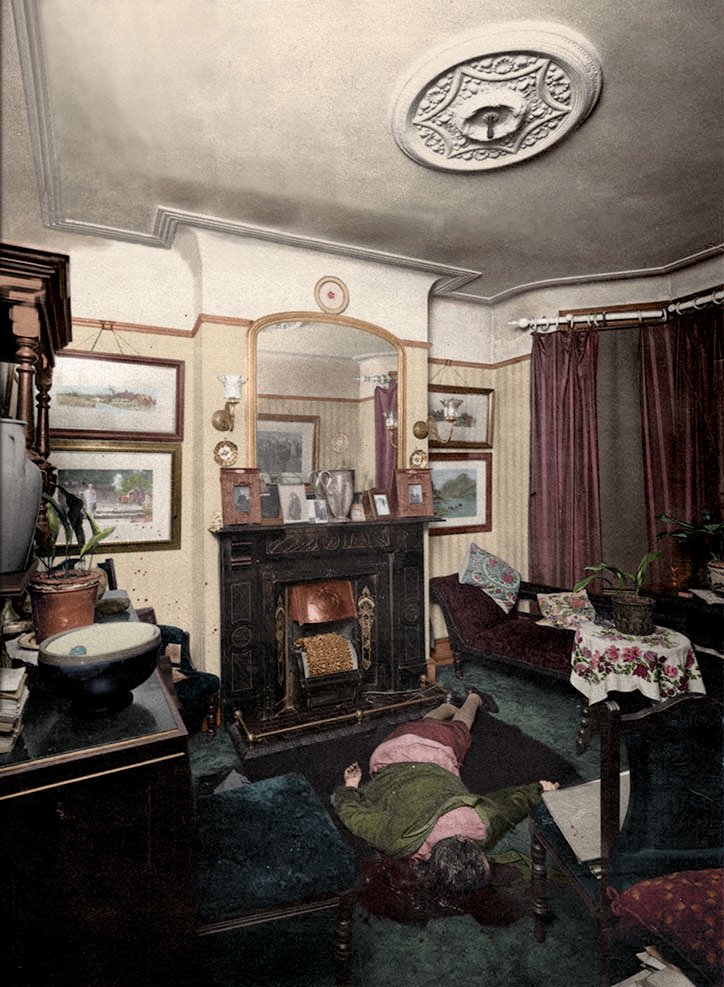
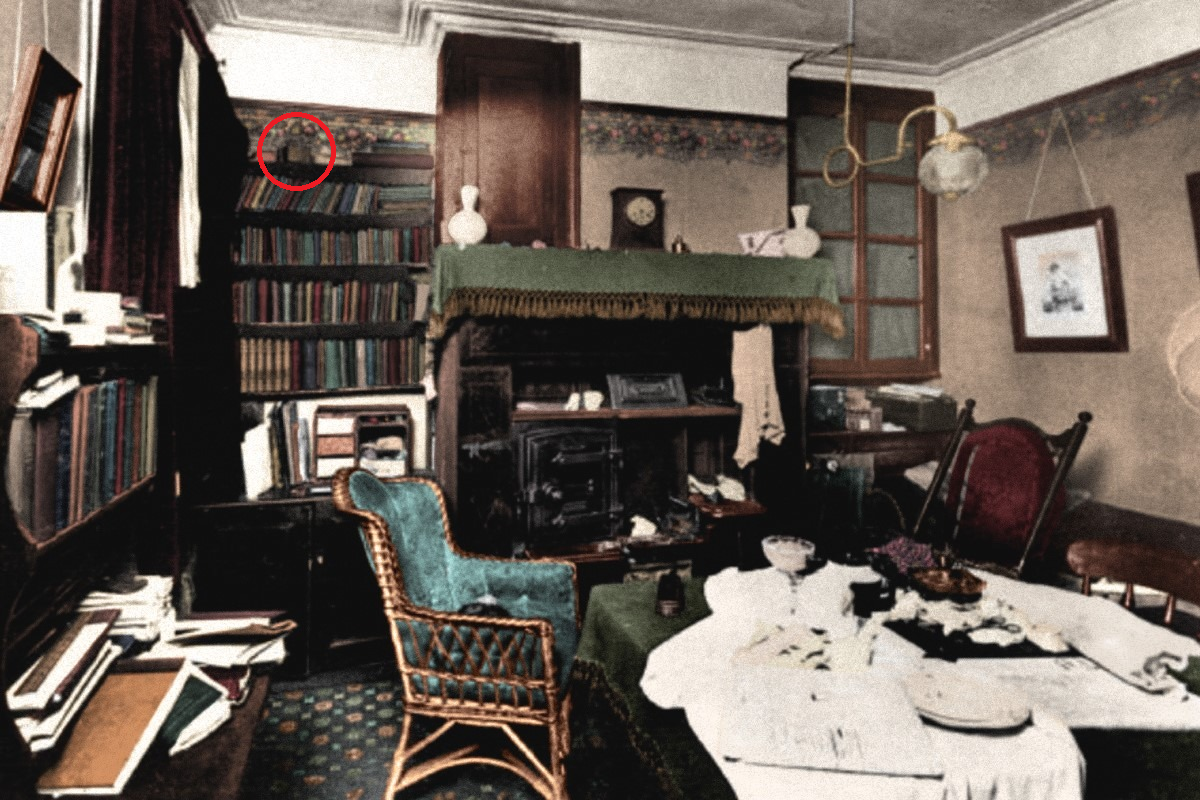
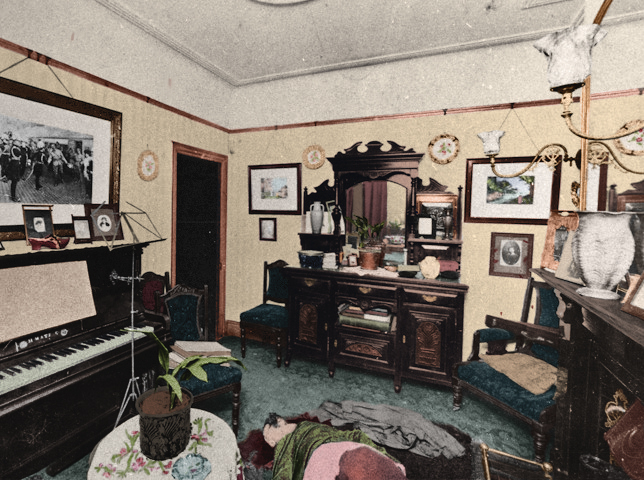
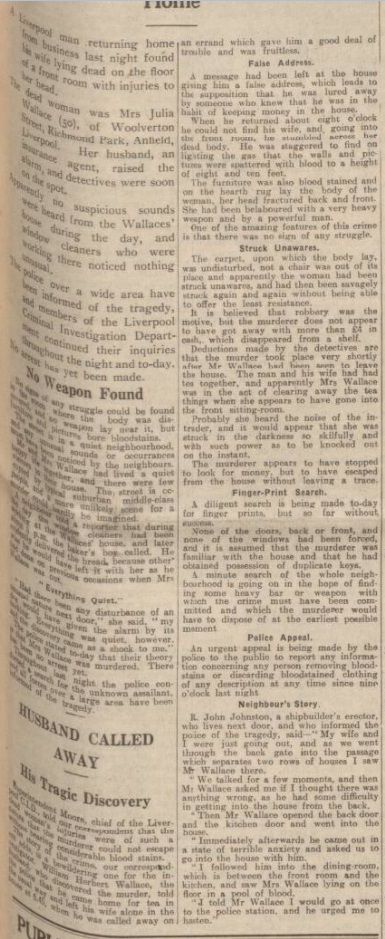
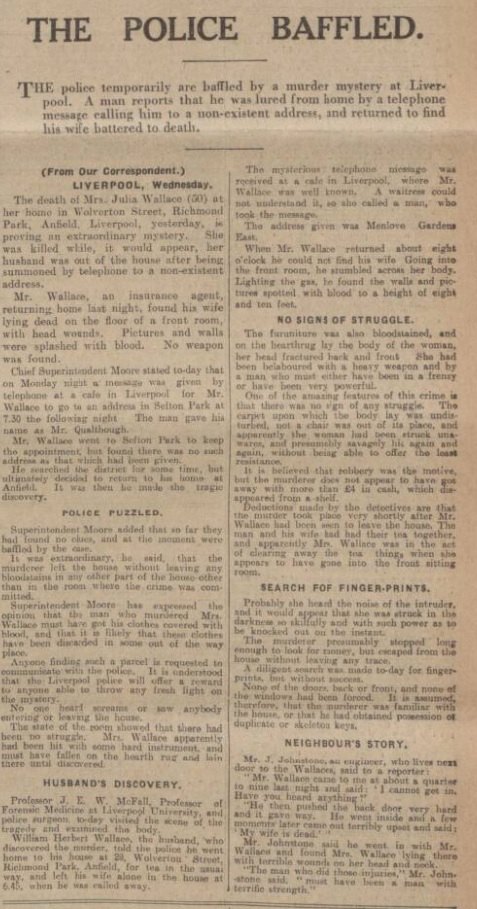
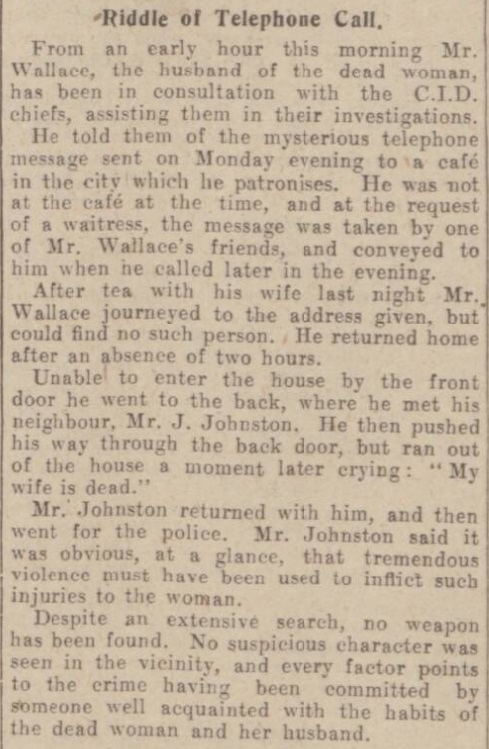
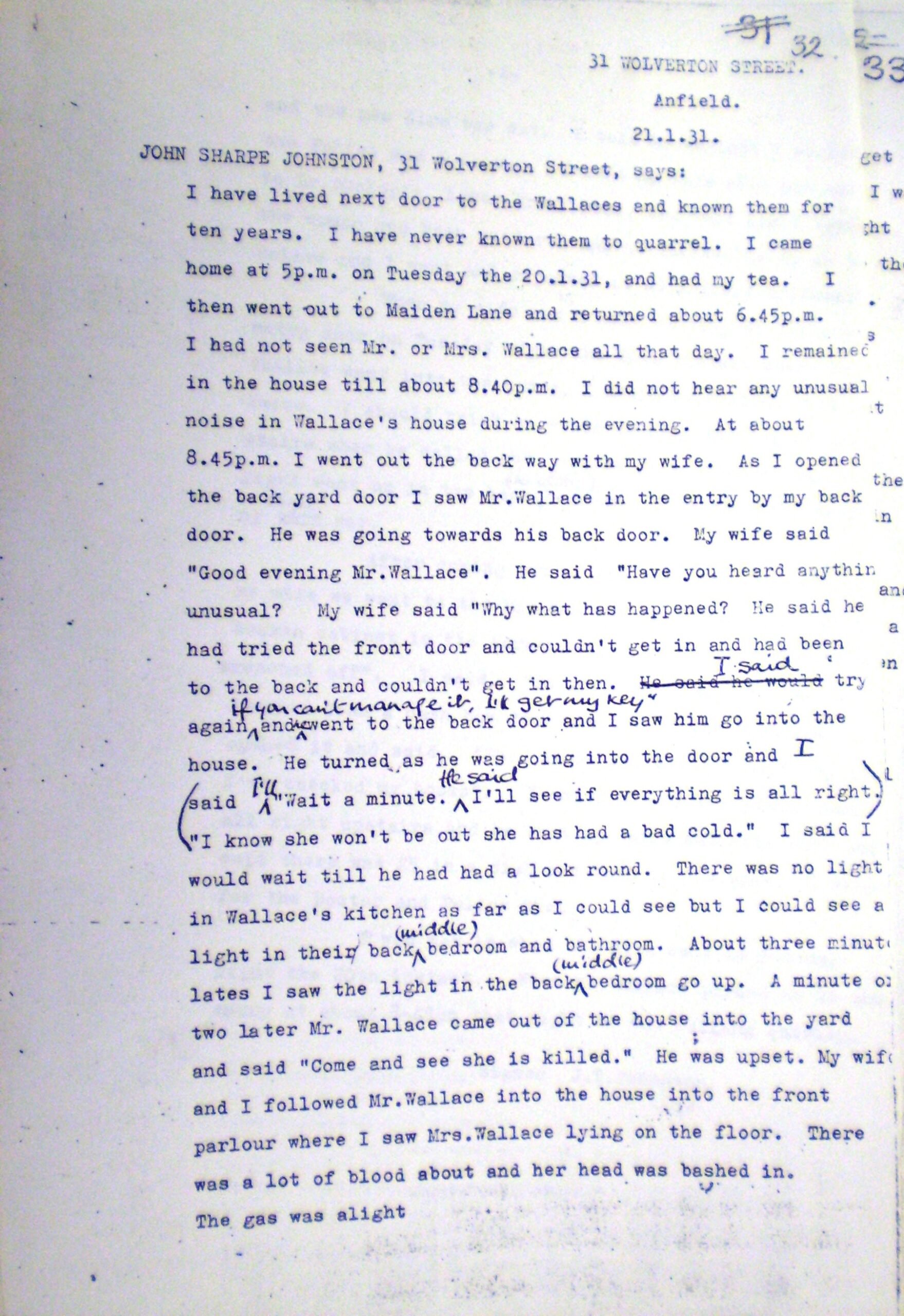
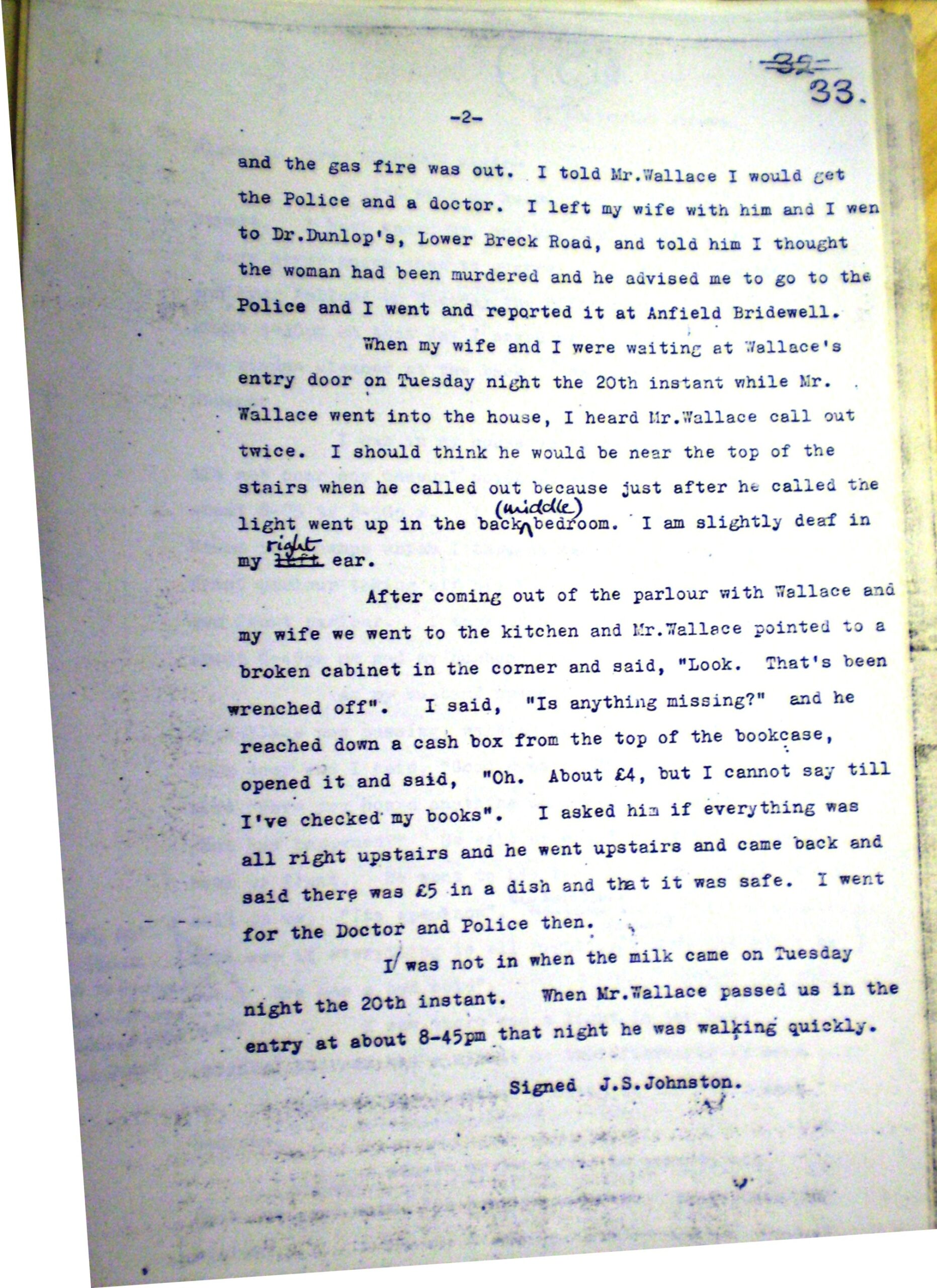
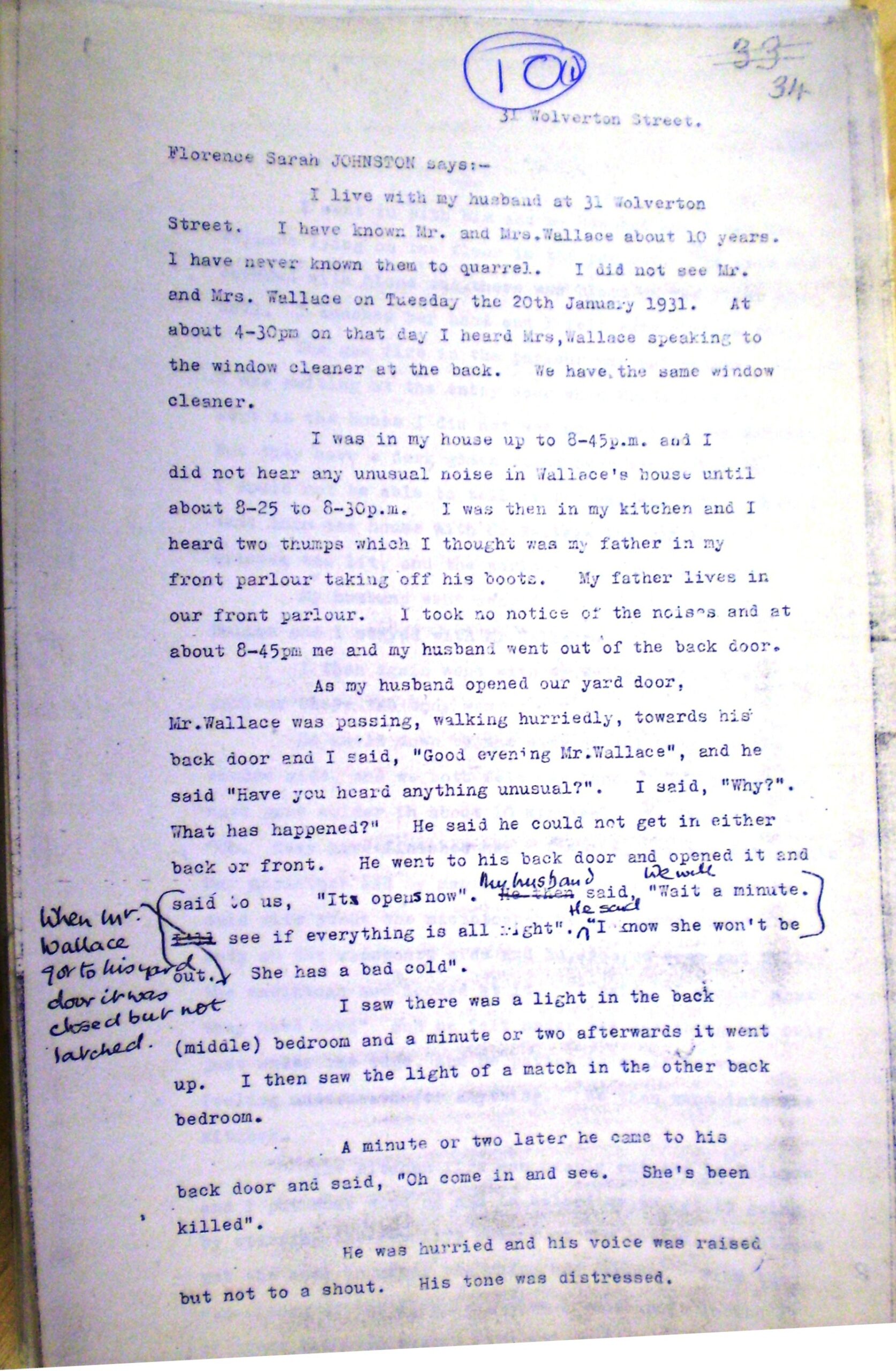
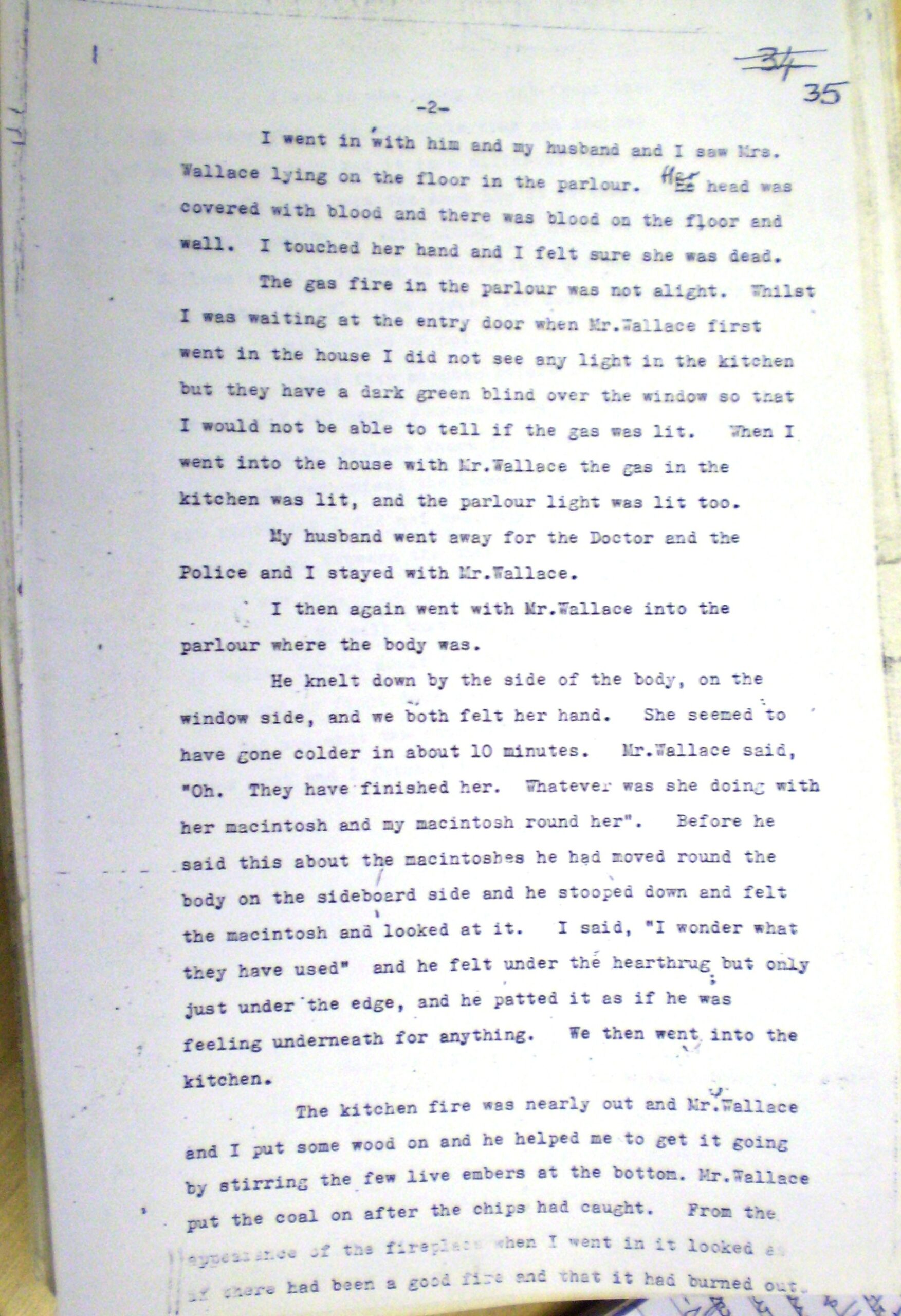
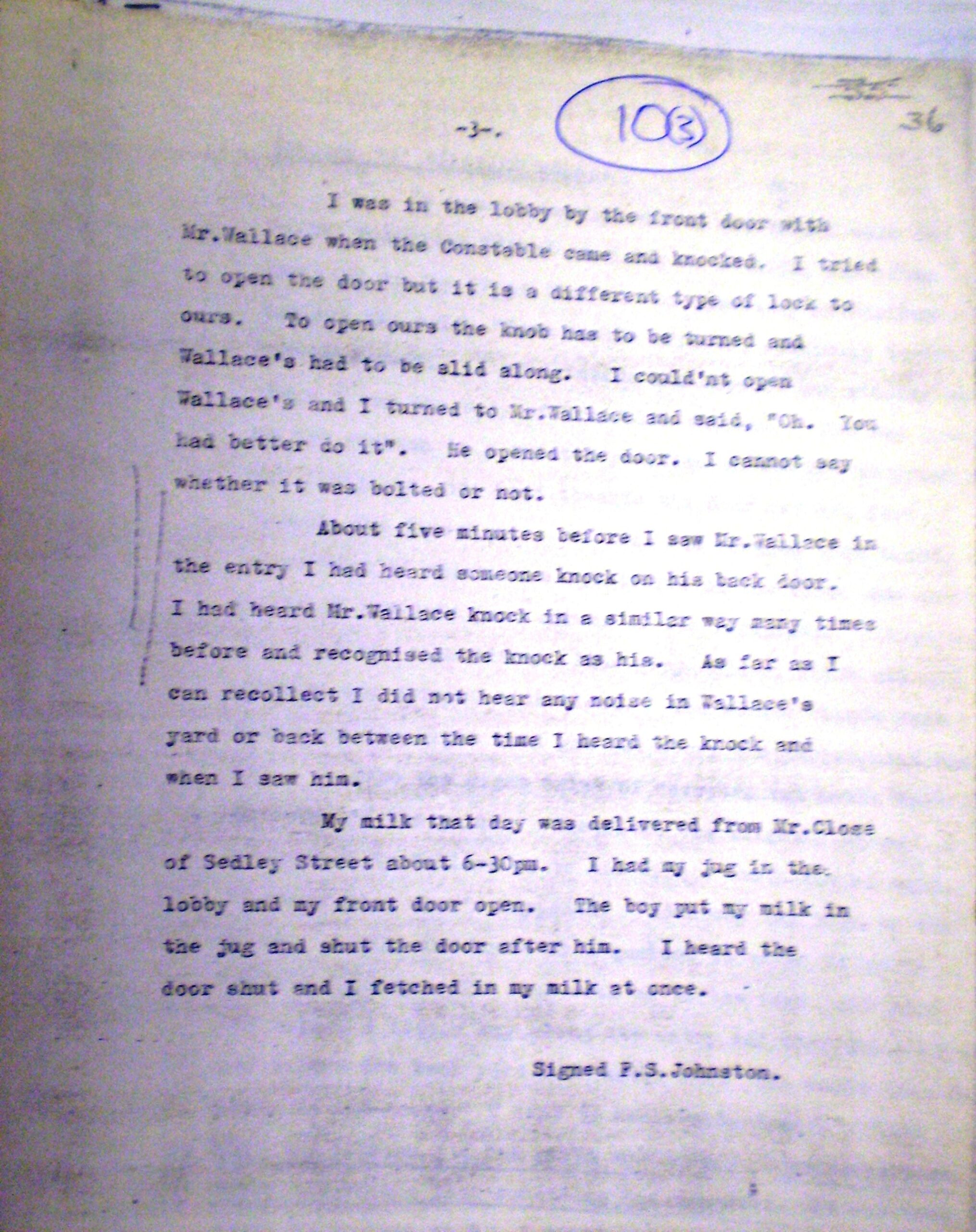
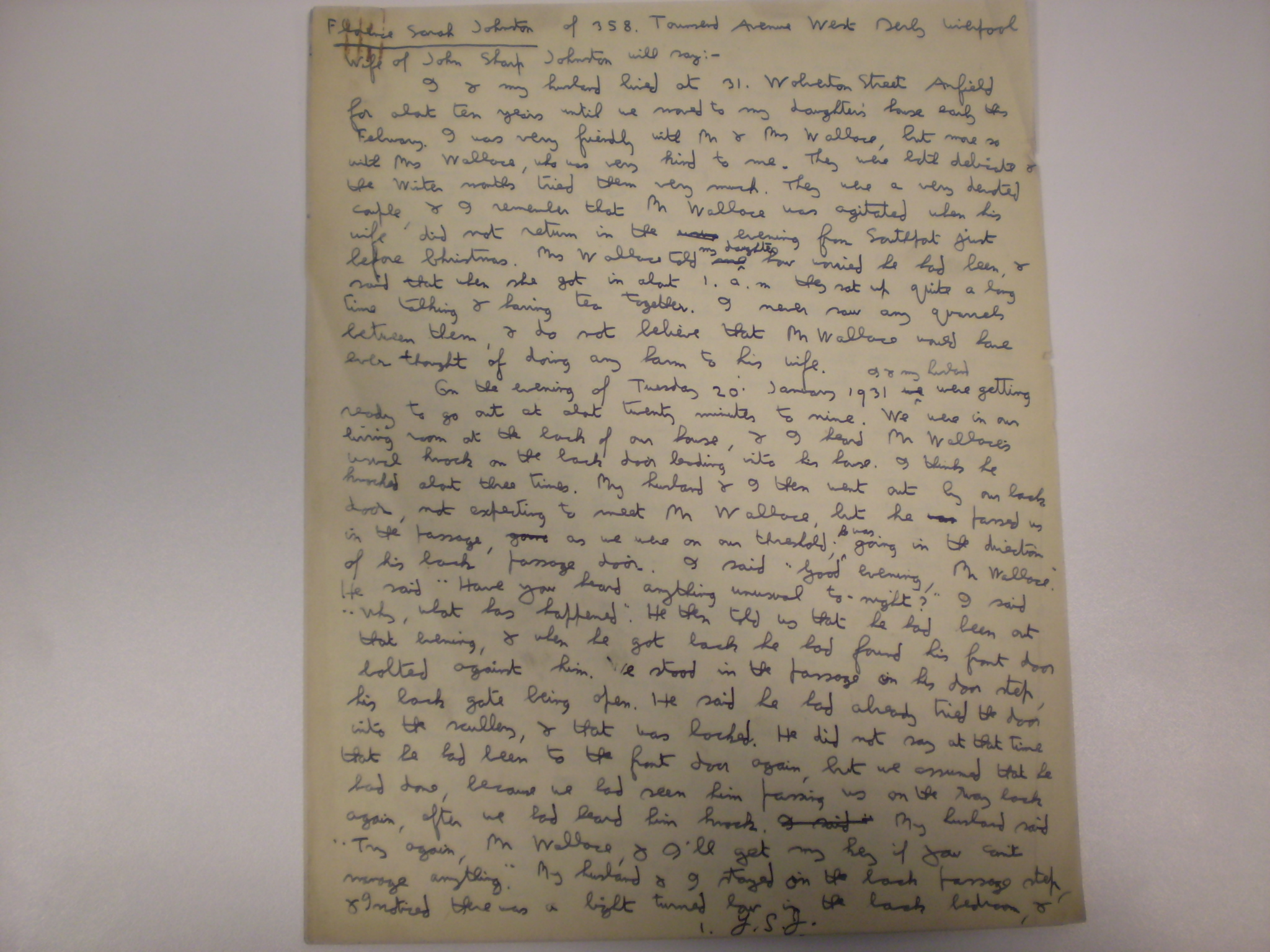
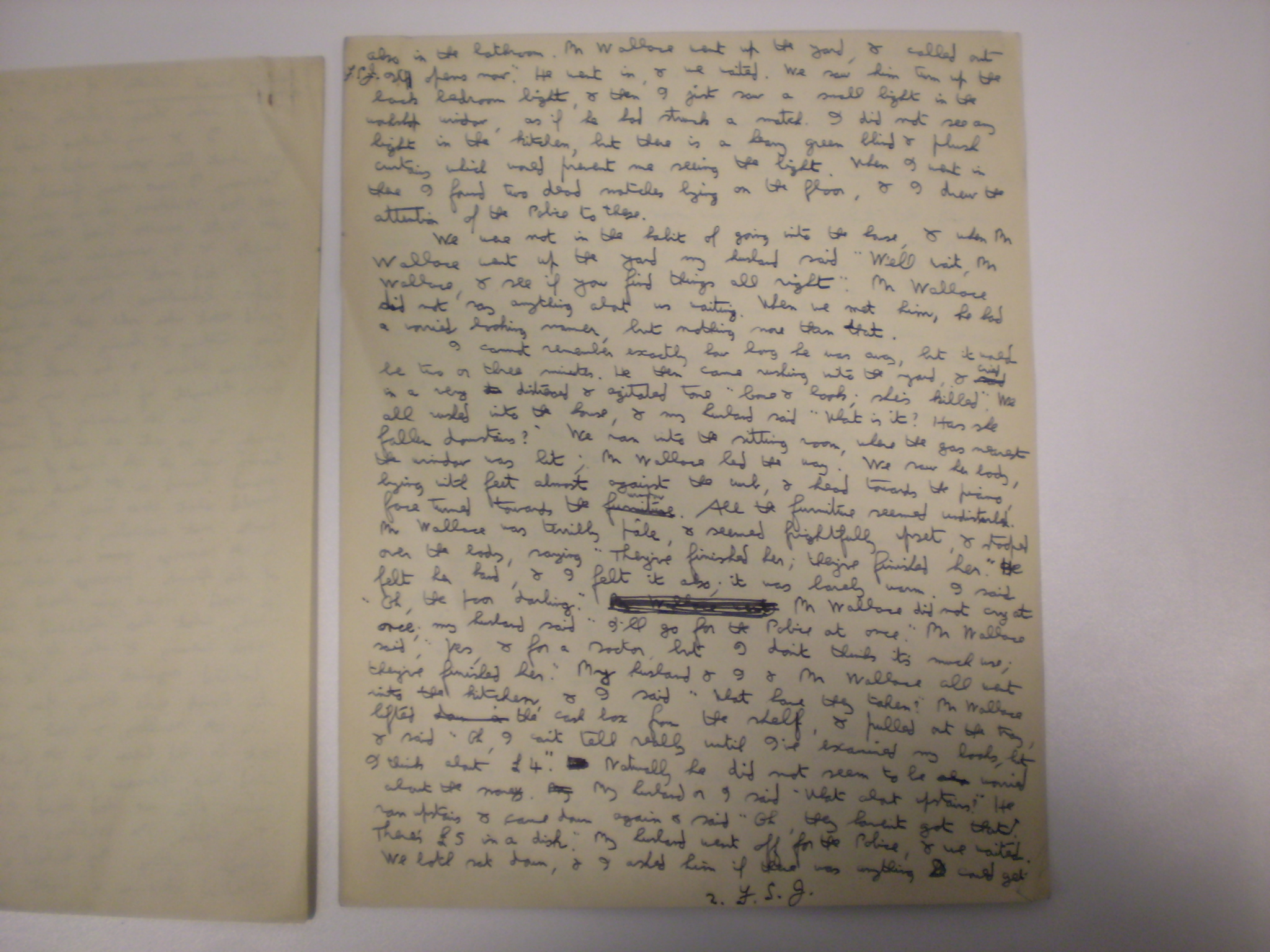
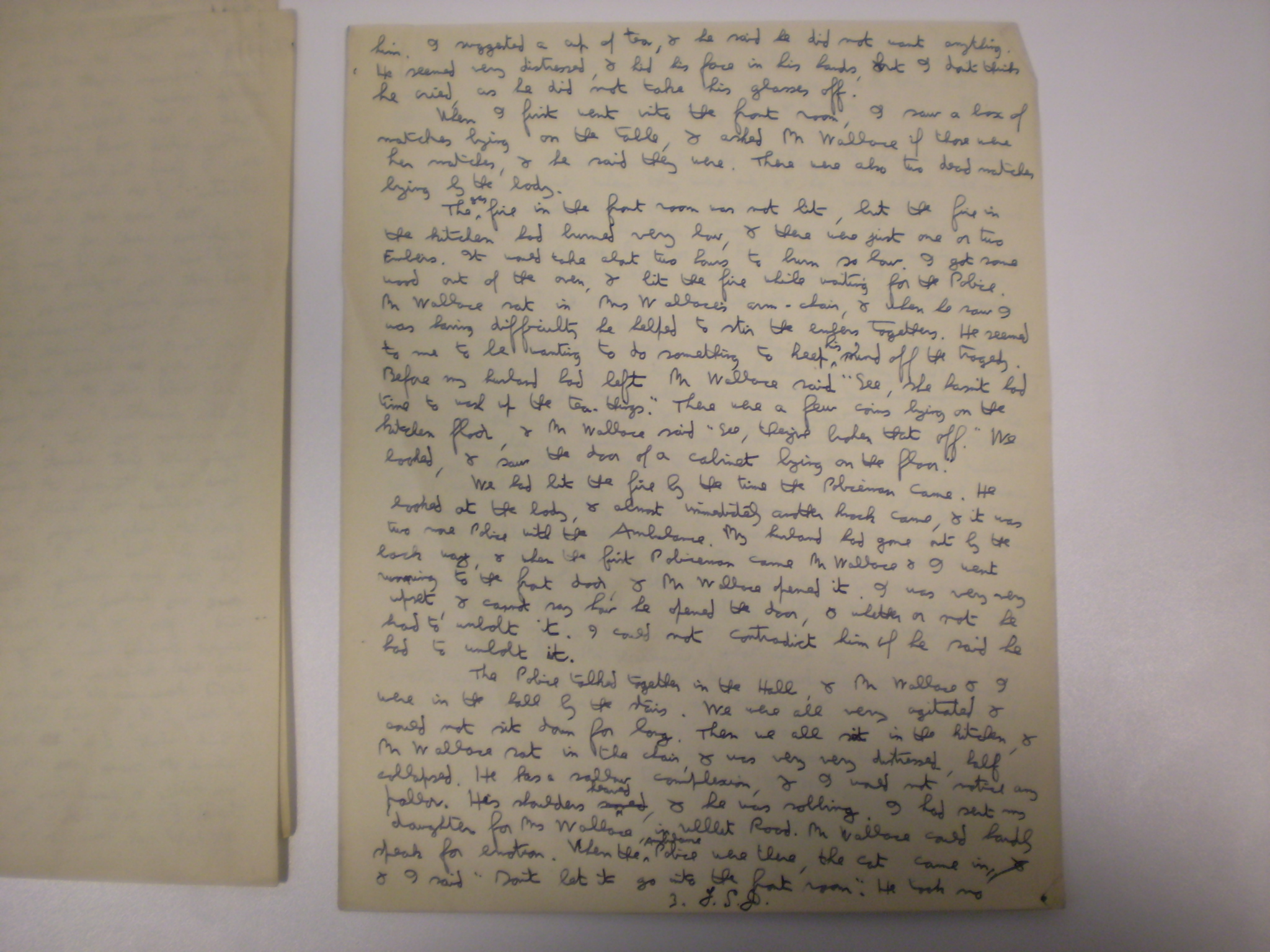
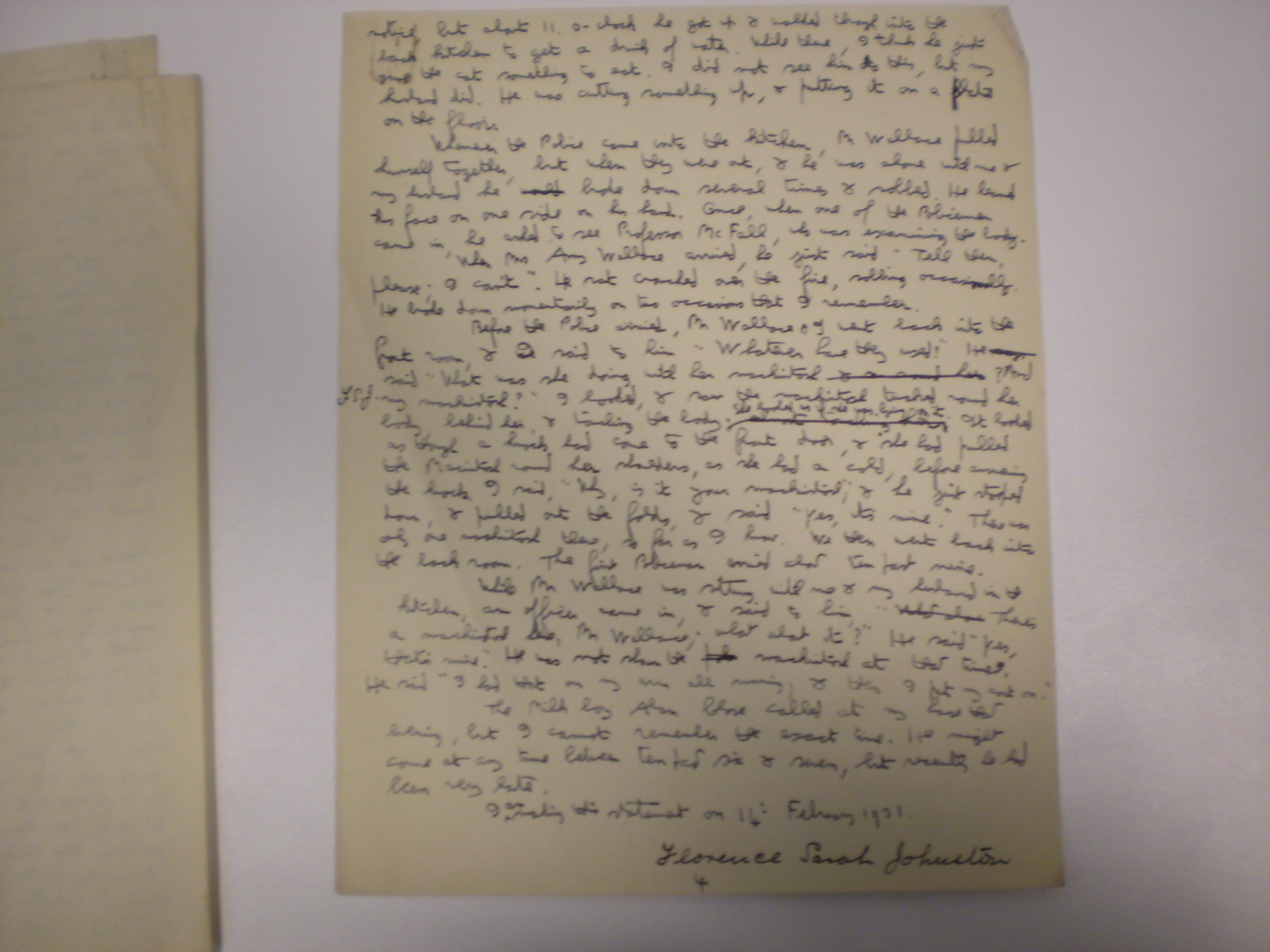
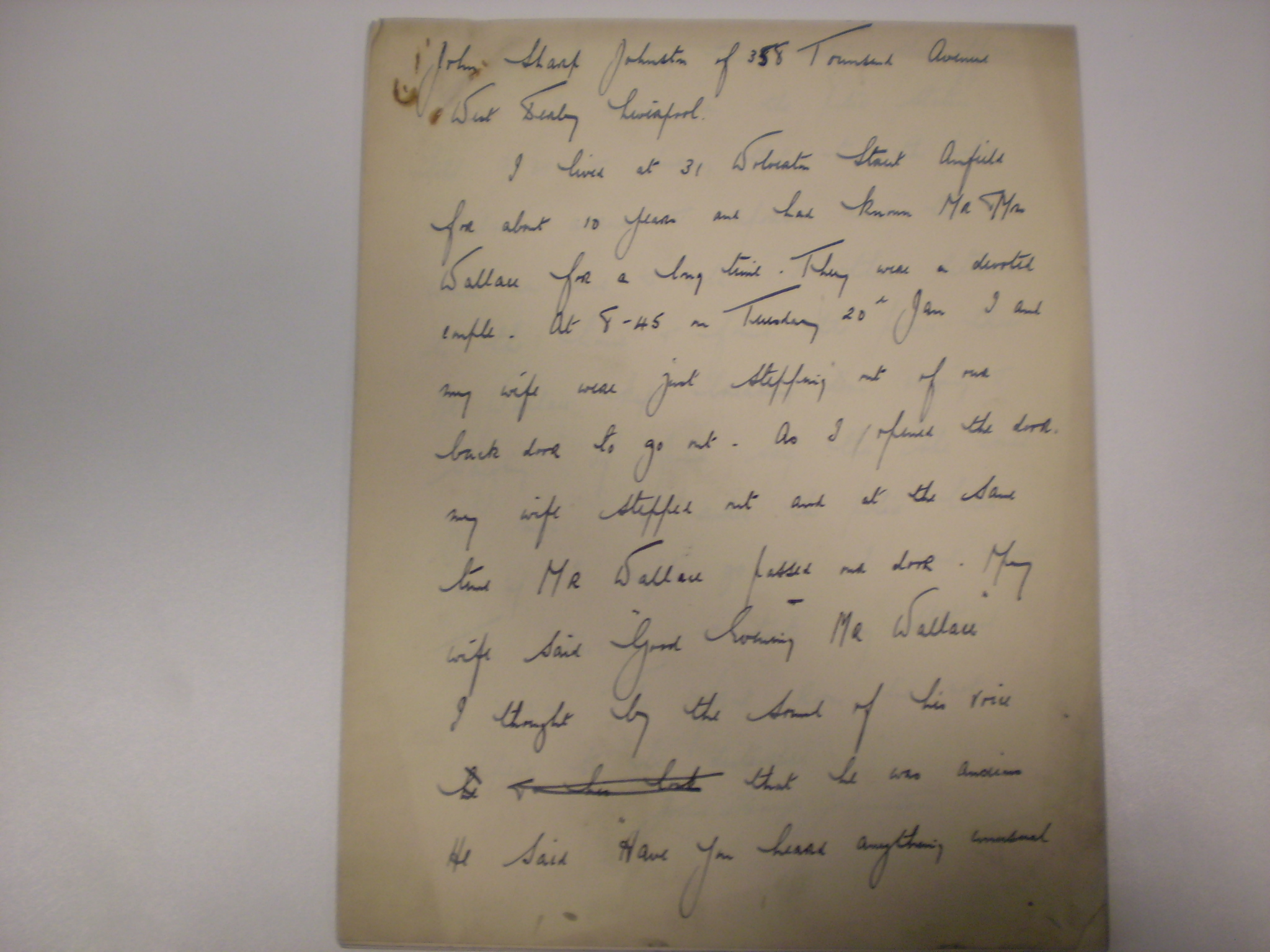
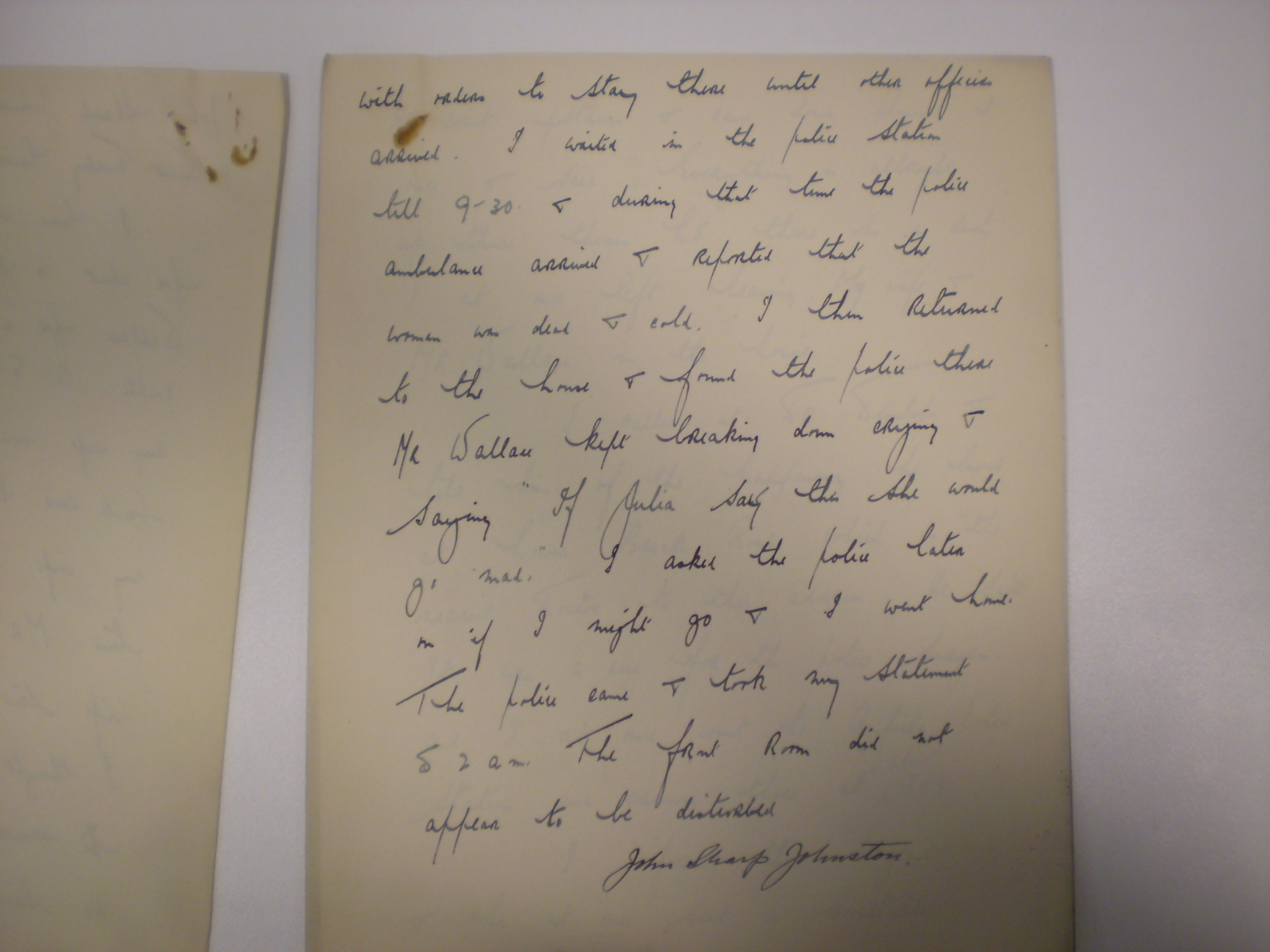
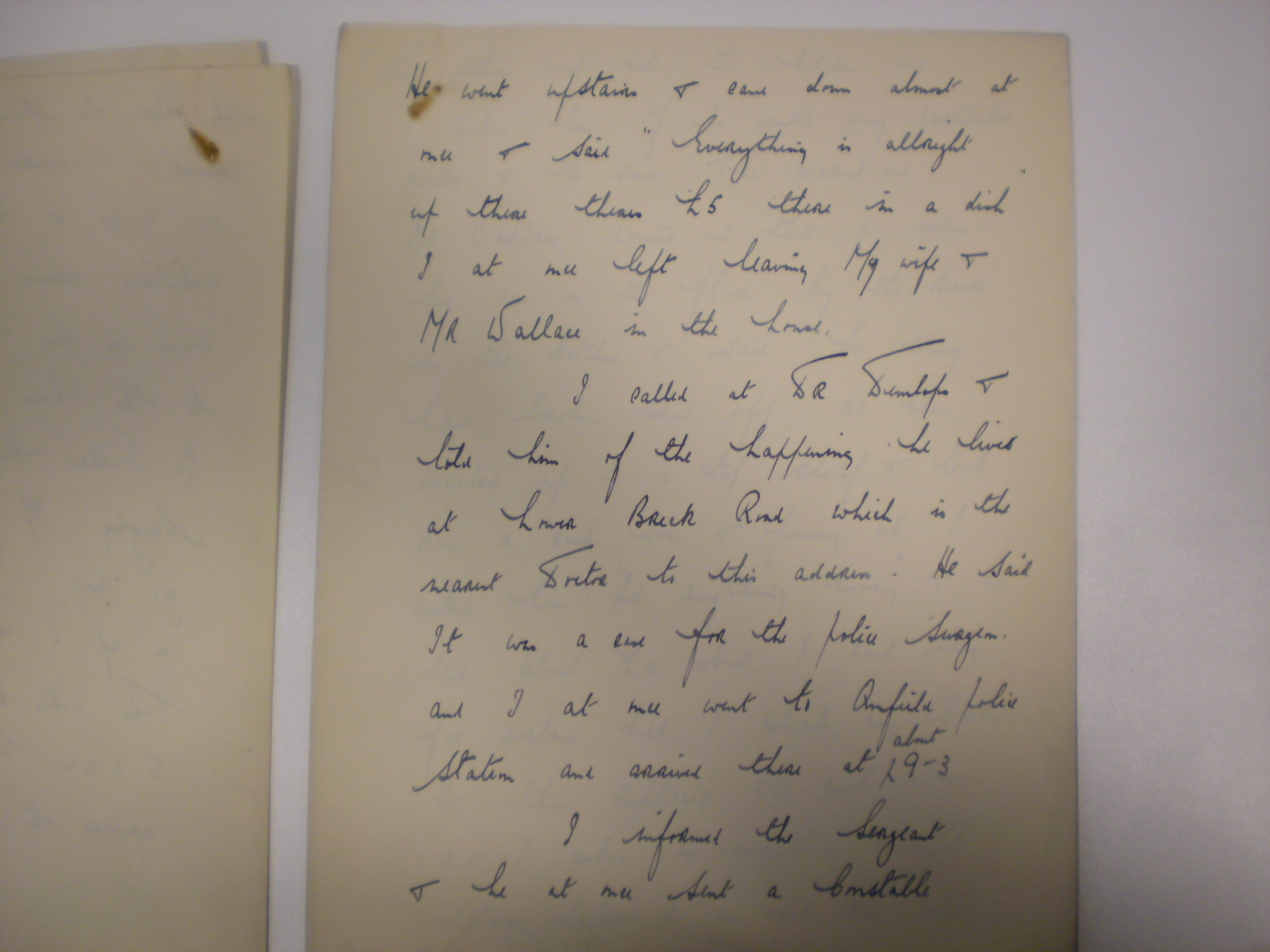
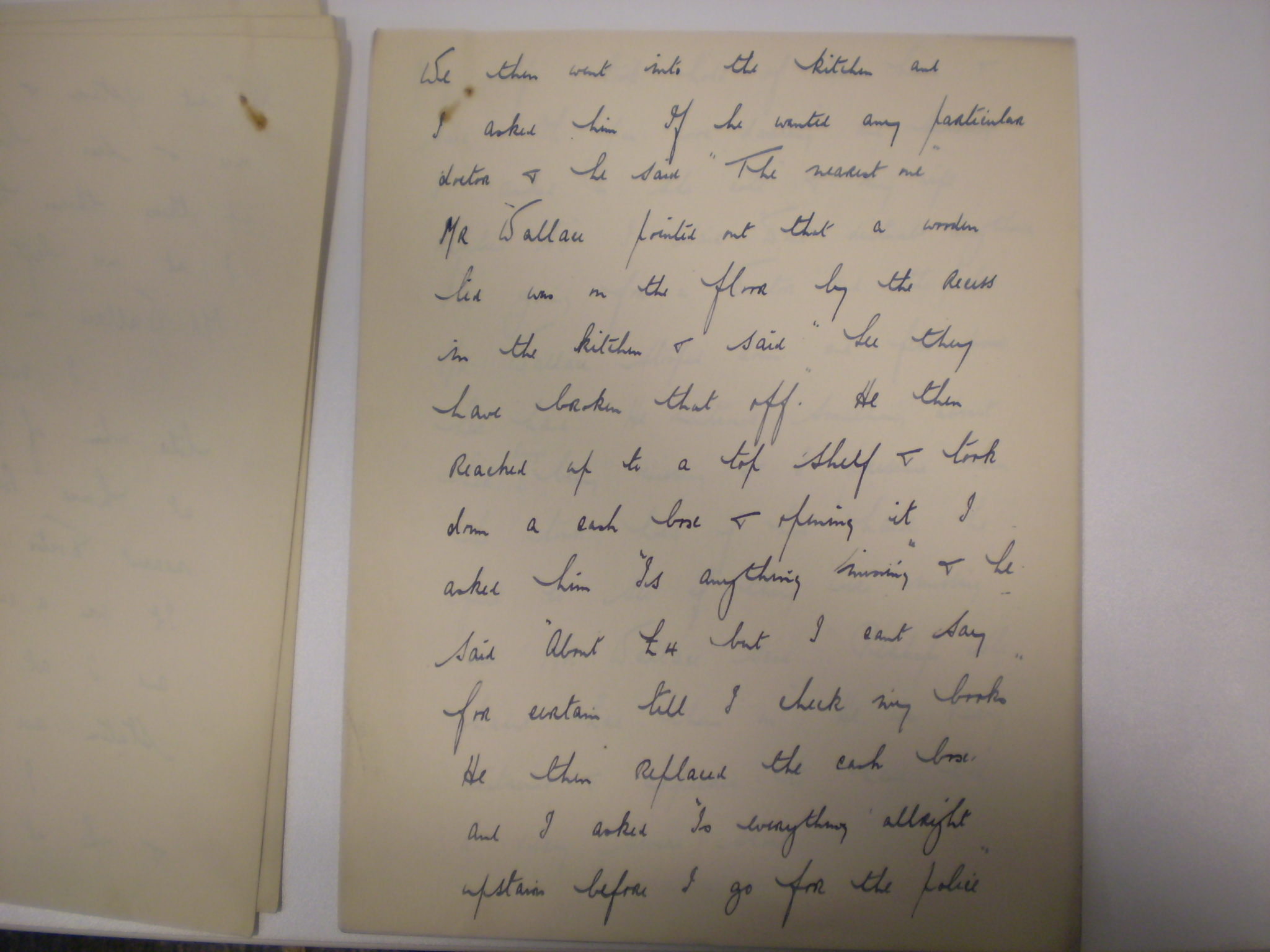
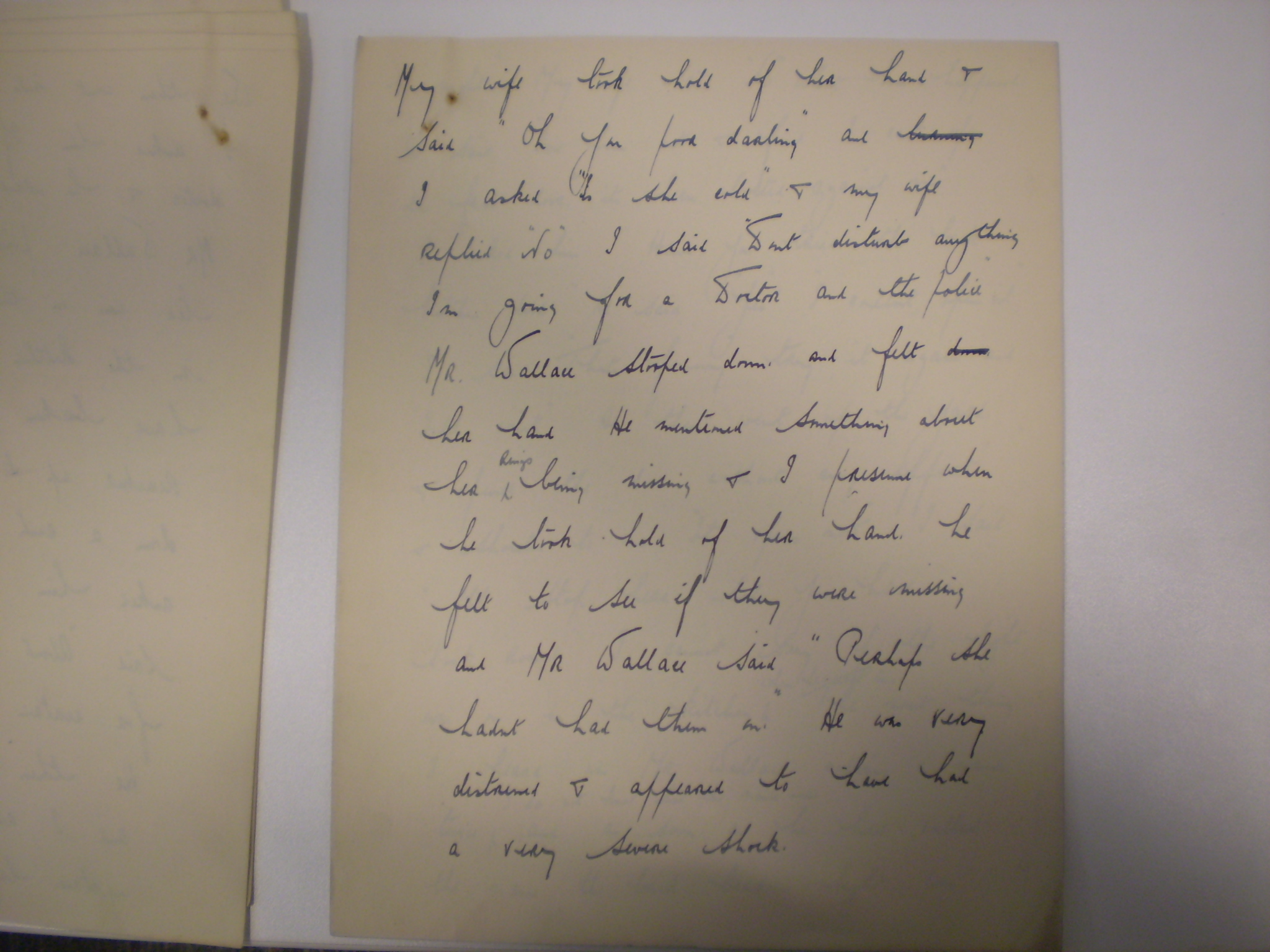
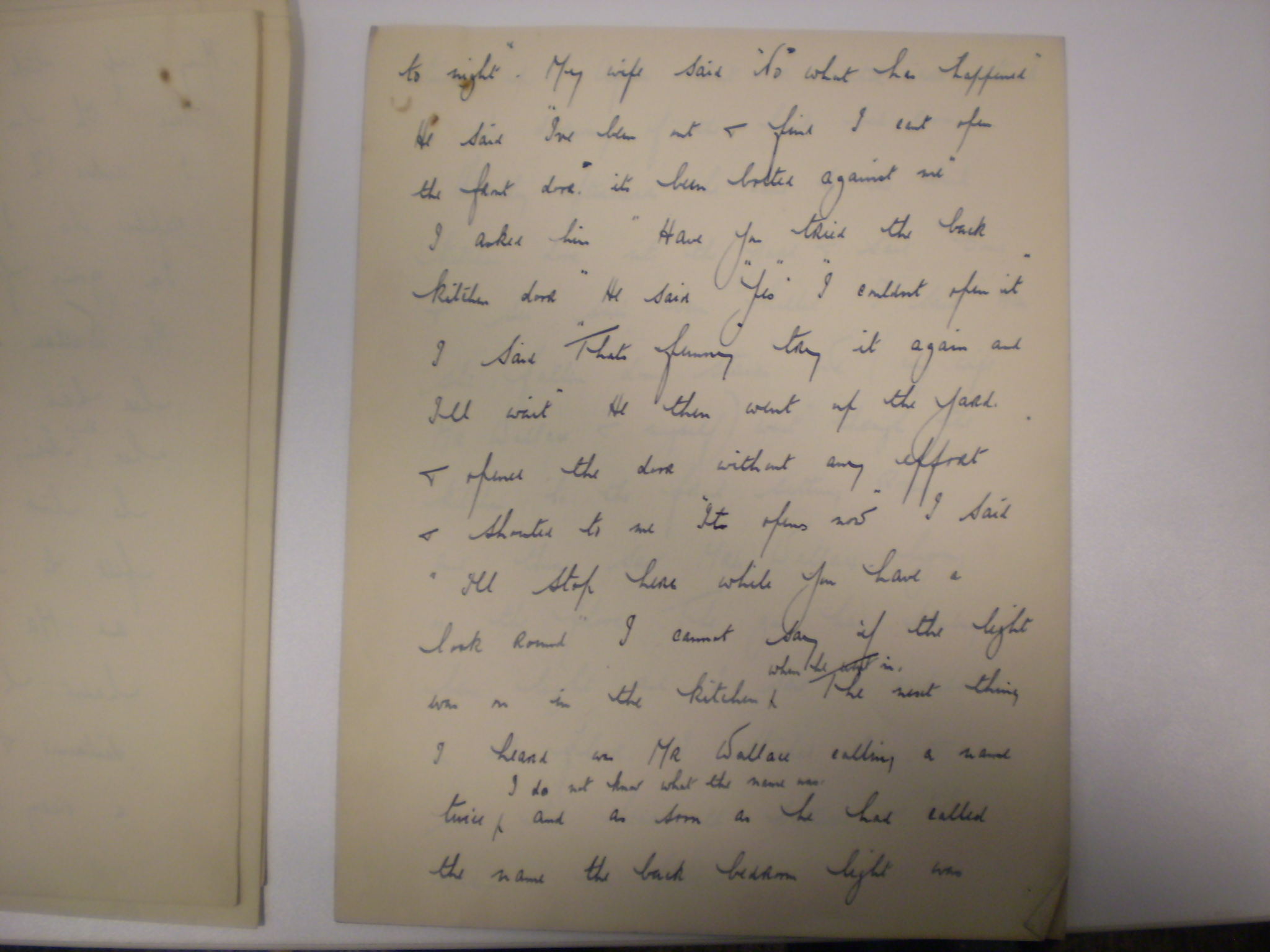
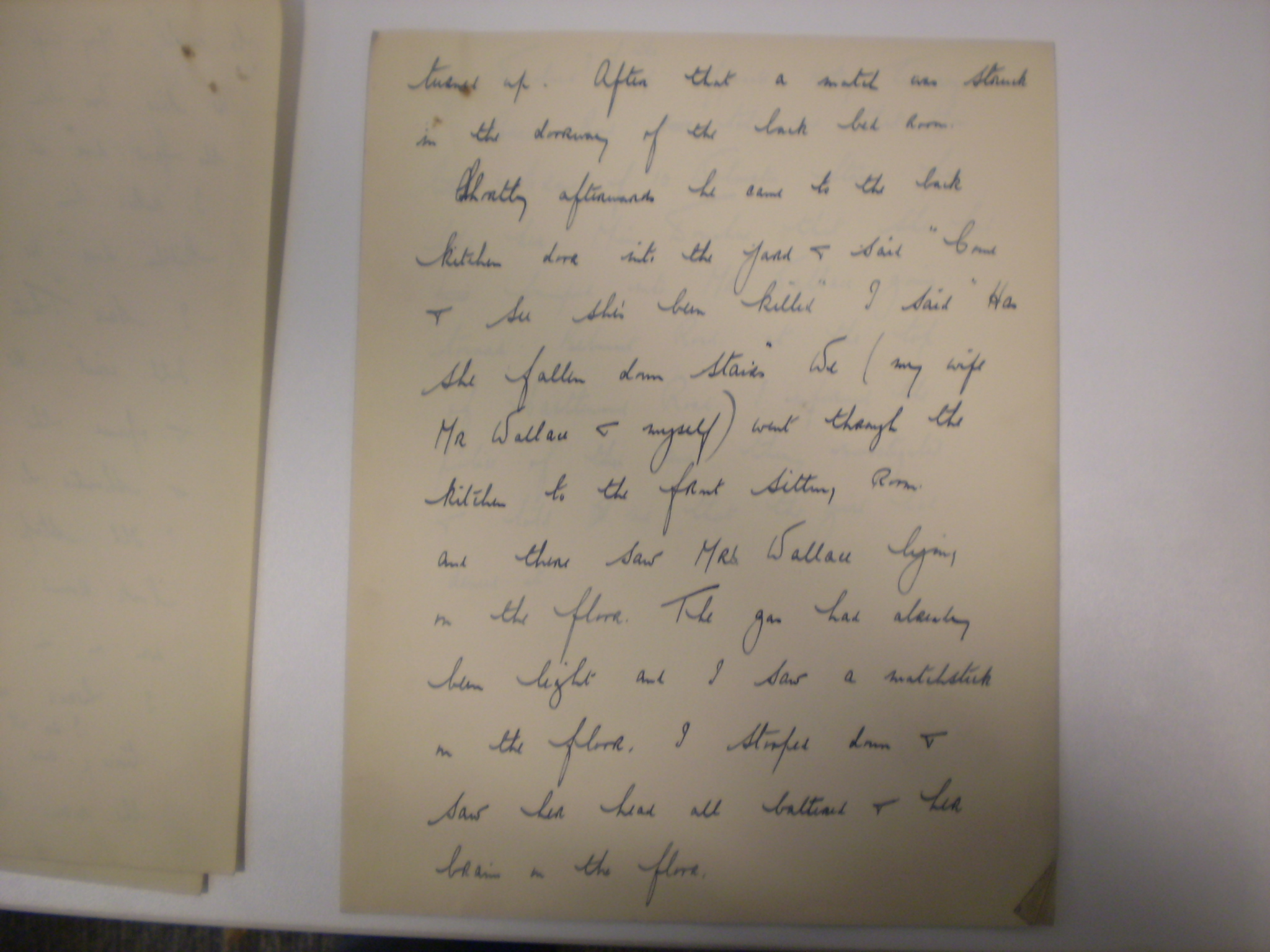
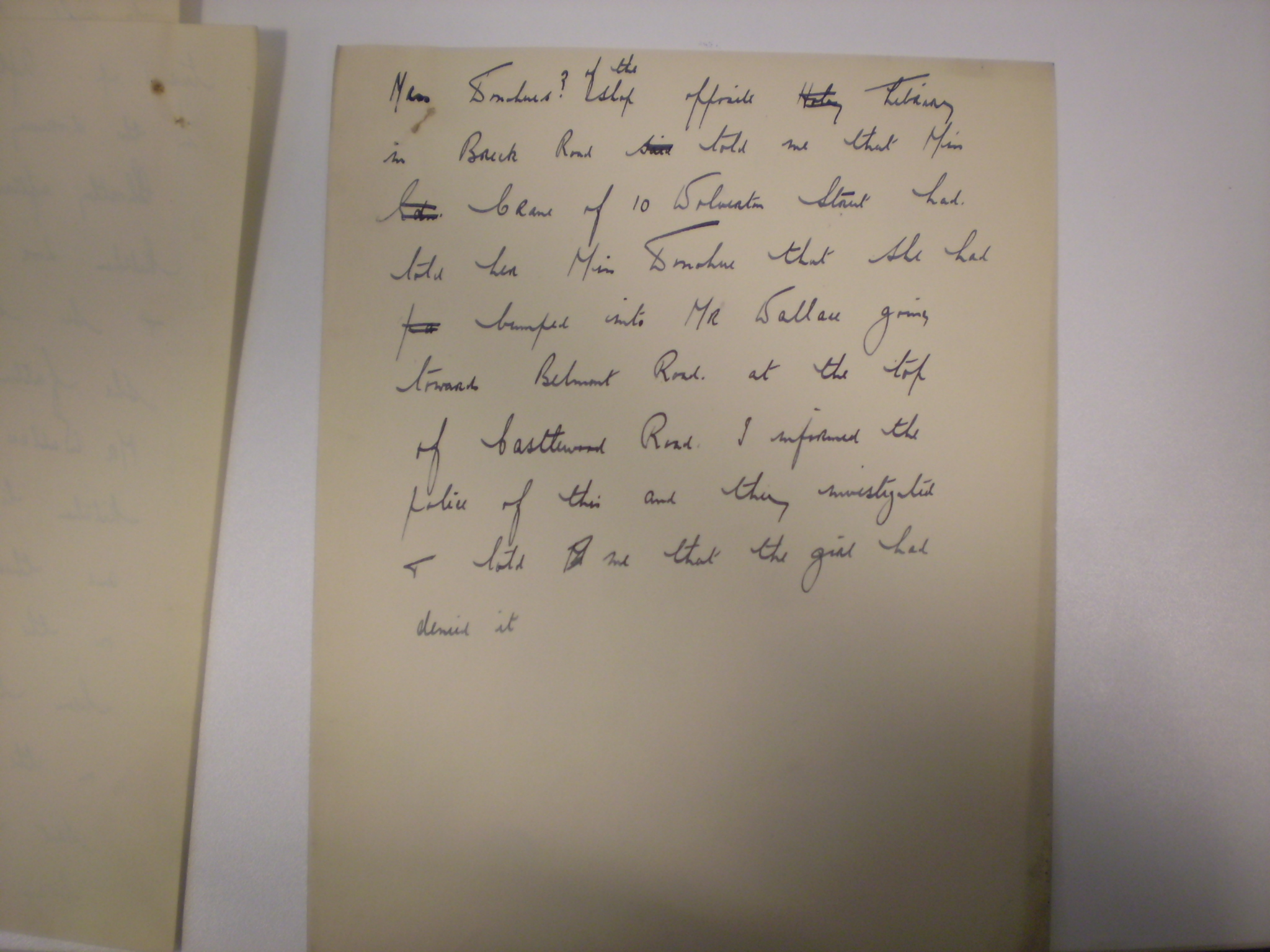
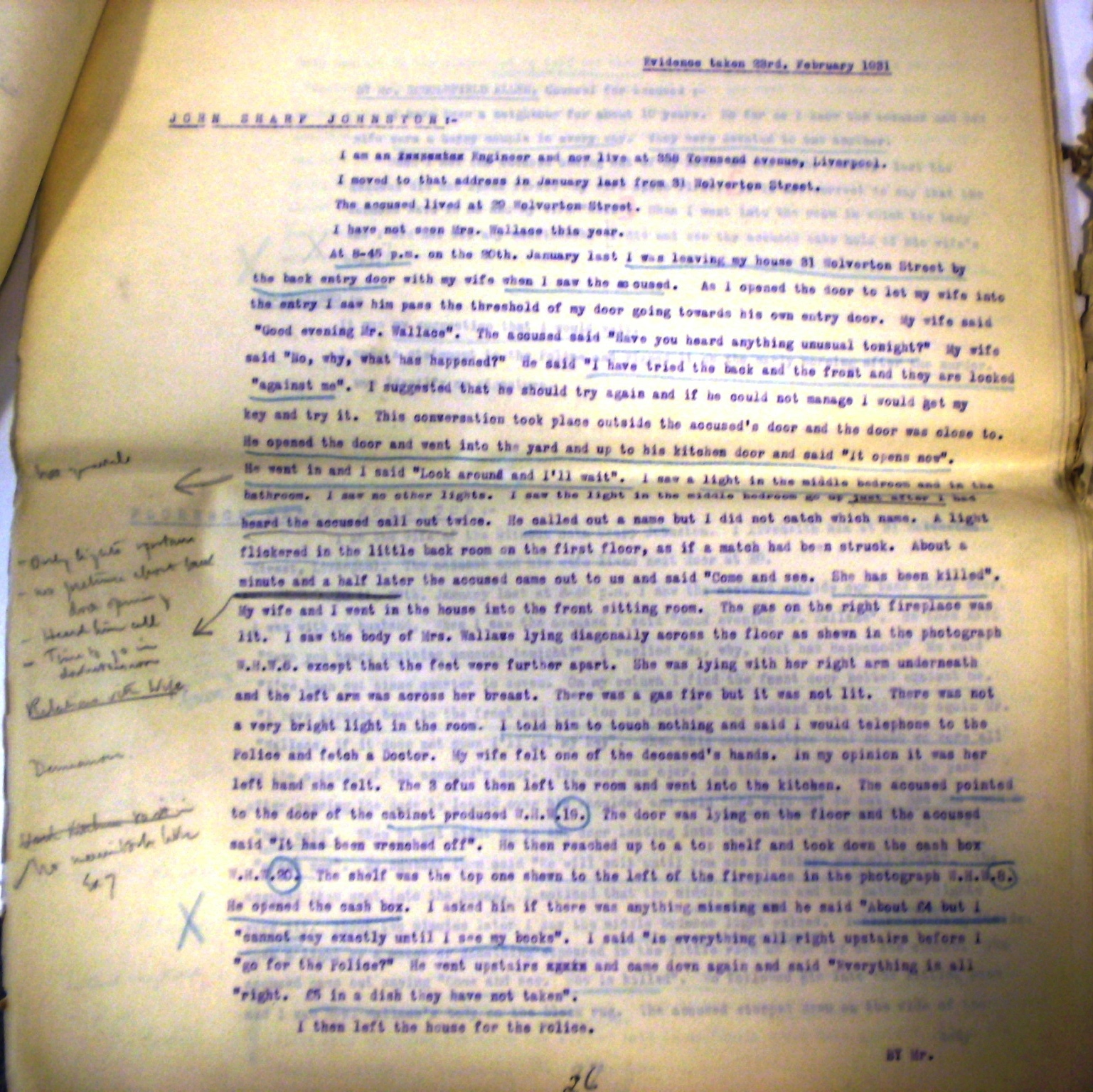
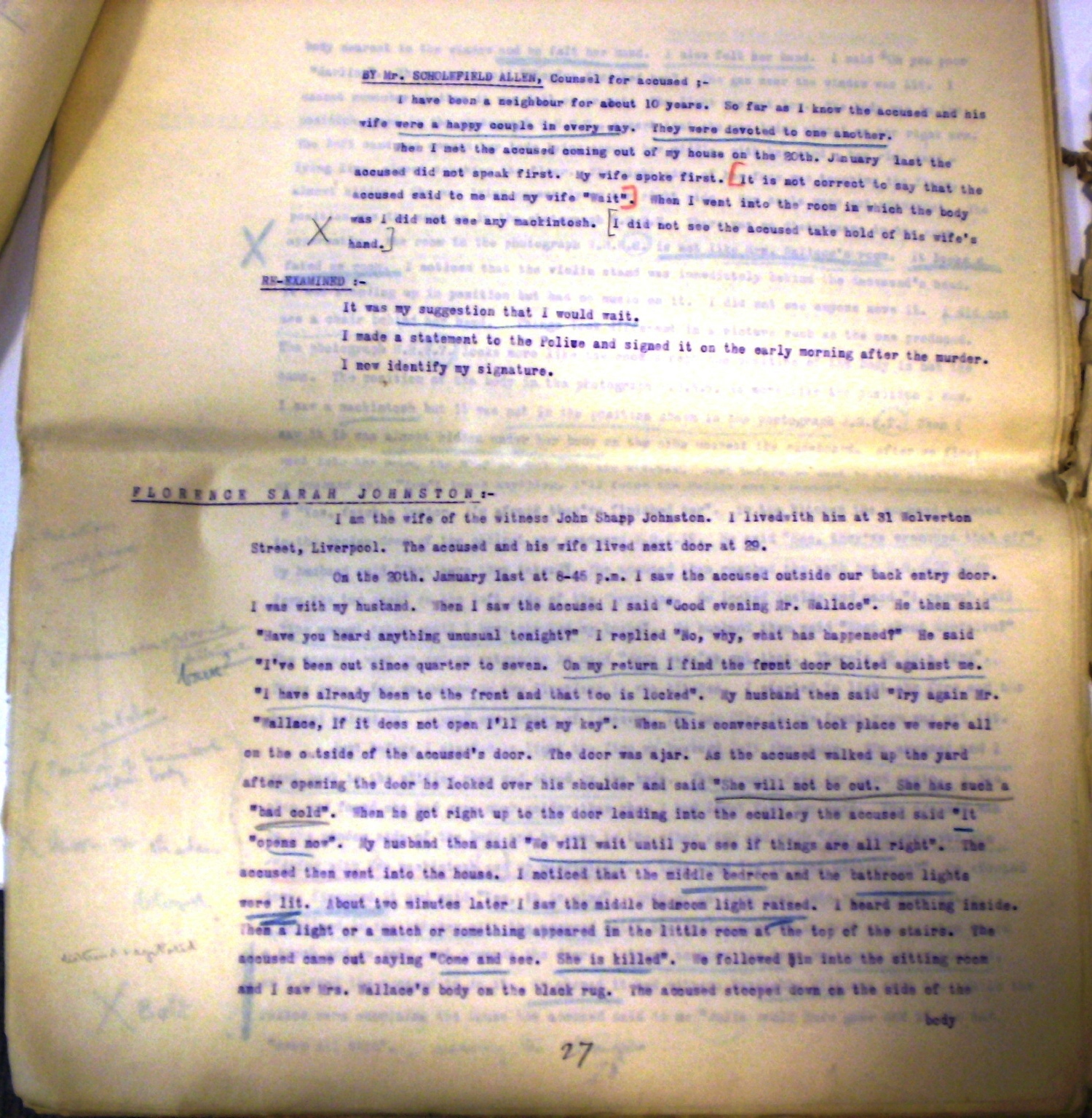
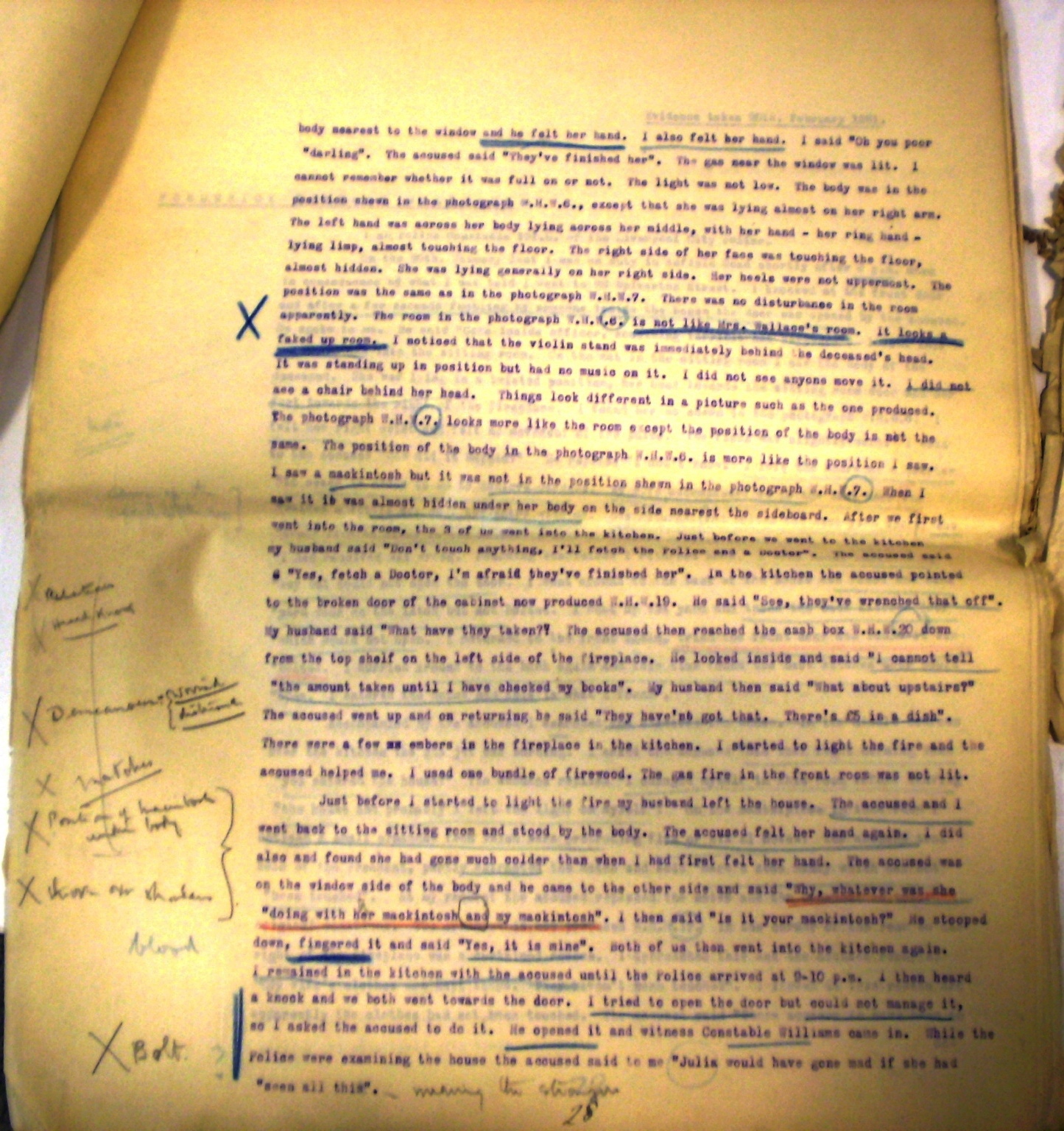
In addition to my last post,here are a couple of observations.Take them as you will.
Finding little money in the cash box,why wasn’t the gas meter forced?
The burns to the clothing on Julia,and on the mackintosh.Wallace states the mackintosh w asn’t in the burnt condition when he last wore it earlier that day.There is suggestion the burns were caused when Julia was killed,yet not one person attending after she was killed reports a smell of burning.
Only one person, Wallace,could have enticed Julia into that cold front room.
If the phone call was a prank,as has been suggested,a real address would have sufficed.That would have been much easier,just as effective,and would require no detailed knowledge of a non existant premises.
The City Analyst corroborates that the burning on both items took place on the day of the murder. Only people close to the Wallace’s were entertained in the kitchen (Amy claims to have been received in there that day), others were taken into the parlour. A stranger would in fact not be taken into the kitchen. While attending the home once weekly for around nine months, Sarah Jane Draper the charwoman had been present when Julia had admitted someone into the home and into the parlour, though she never saw these people she heard their voices. Others including Florence Johnston reported being taken into that room.
A real address would suffice better in any planned robbery or murder. The round trip in and of itself is almost an hour. The address is more in line with a practical joke because it is funnier to send someone on a wild goose chase, or otherwise a mistake by the caller.
It is considered highly implausible to even not possible by forensic professionals that Wallace is the murderer if the sighting by the milk boy is legitimate. The evidence I have had analyzed appears to rule out even an unsuccessful attempt at using the mackintosh jacket as a shield. Professor McFall and the prosecution believed that Wallace had dressed as his wife in order to fool Alan Close in order to get around this.
The killer would have blood upon him even if the mackintosh had been worn or held, but by the evidence it was not worn or held by the assailant. Nor was it over Julia’s head during at least some of the blows due to the spray up the walls, and likely not over the head for any due to the abscence of detected tears in the fabric which should be present and picked up by the lab – albeit burning (the exact amount of which is un-stated, and statements vary as to which side was burned) may obscure this.
I am seeking even further opinion from specialists in the field of blood pattern analysis although I already have three forensic professionals and doctors rule the prosecution’s raincoat idea out, but I think that will solidify it entirely. Along with this, I seek to be able to place her and her attacker in the room because it will help greatly to discern what took place in there. For example if she is reclining on the couch there, or doing the gas, those would suggest different things. Though the time the radiants would take to heat up should mean that she was not hit after lighting the fire, it would need some minutes to heat up enough to cause the damage.
It is an assumption that the burning is caused by the fireplace but that it occurred on that evening is according to the Analyst factually corroborated.